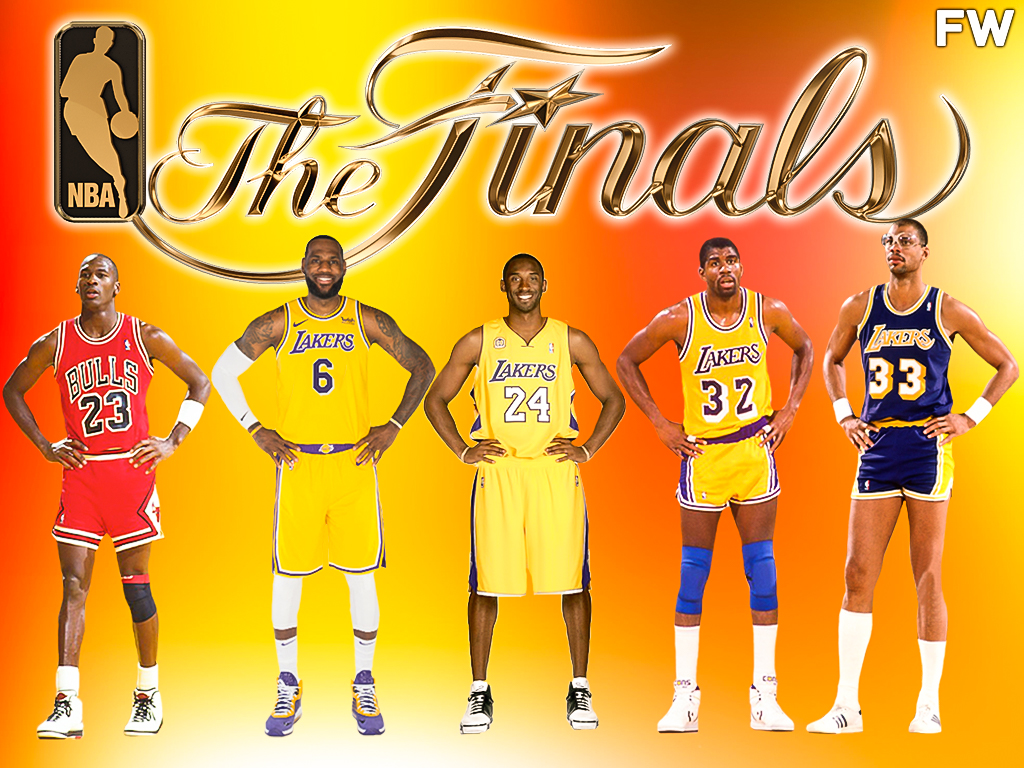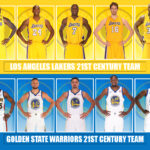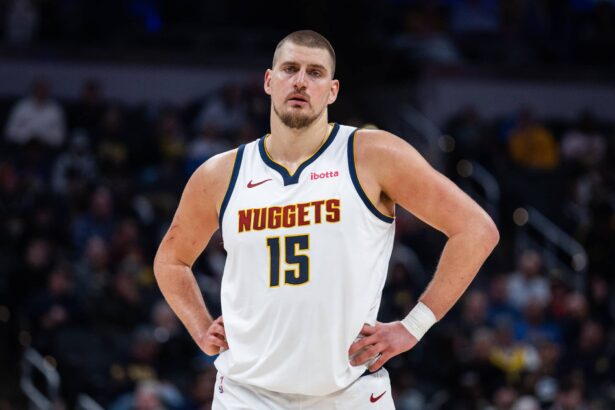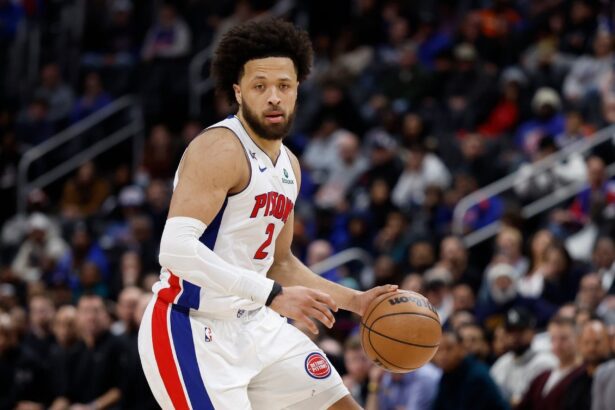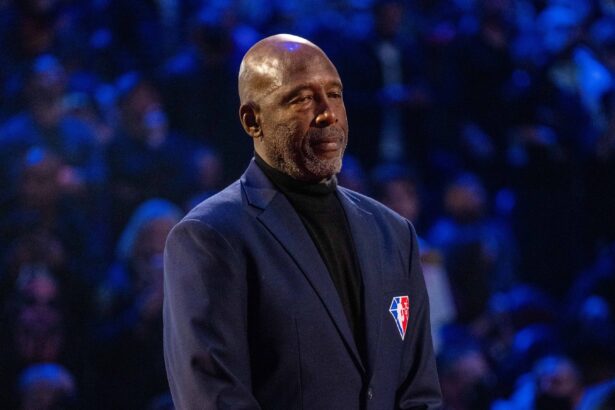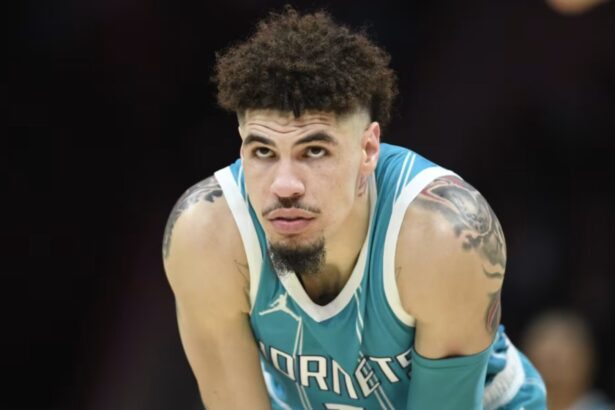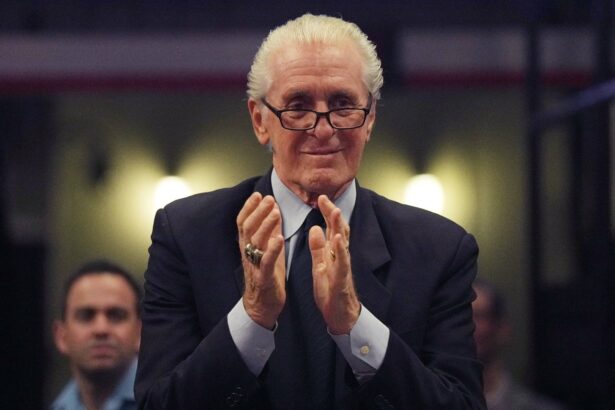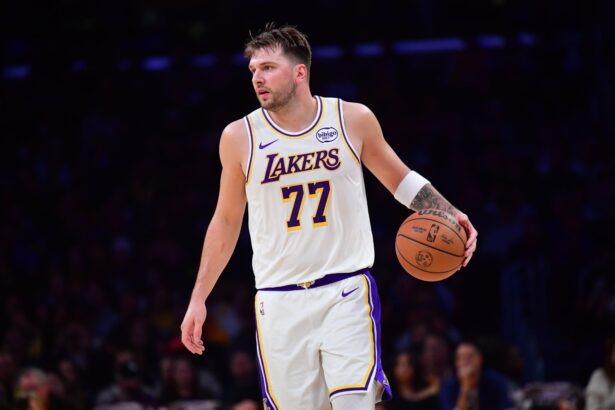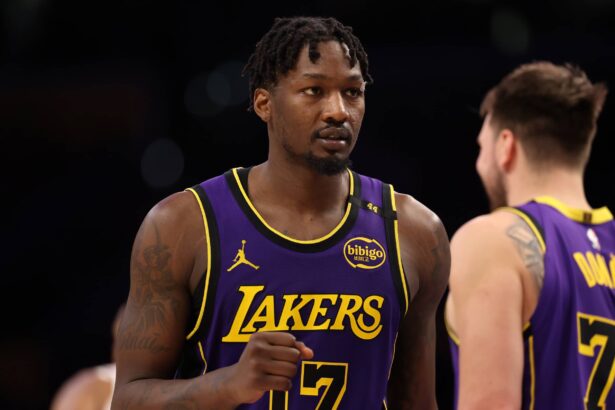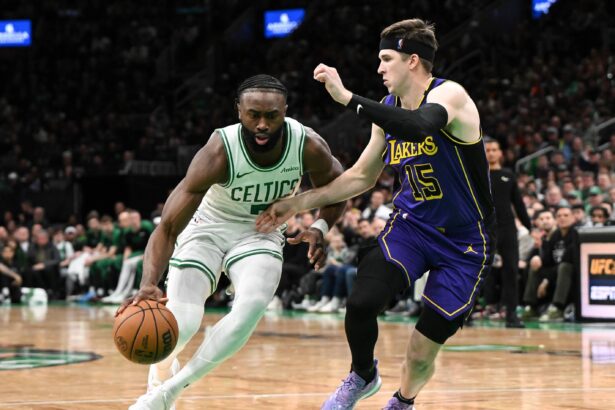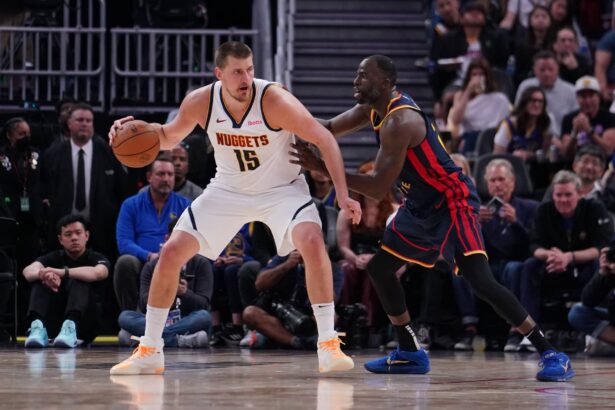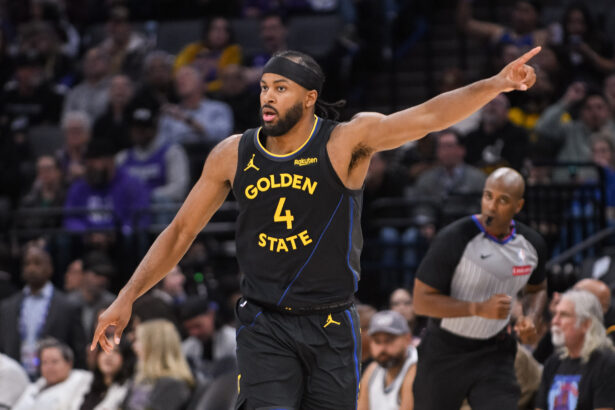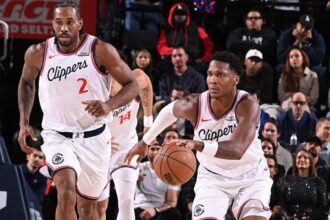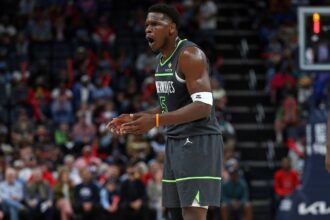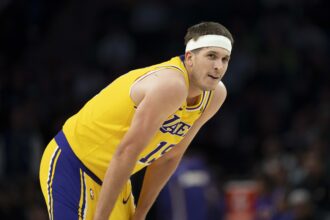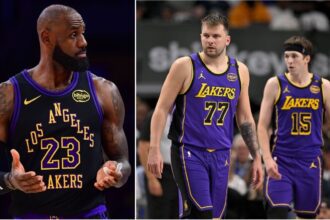The NBA Finals is one of the biggest stages in sports. It is where legacies are built or they crumble at the feet of the giants competing in them. The NBA Finals are where legends can be born and greatness is defined as leading your team to the ultimate end goal of hoisting the Larry O’Brien Trophy above your heads. Dreams are achieved and shattered all in one 7-game series between the two best teams for that respective season.
- Charles Barkley
- Giannis Antetokounmpo
- David Robinson
- Elgin Baylor
- Dirk Nowitzki
- Julius Erving
- Kevin Garnett
- Dwyane Wade
- Moses Malone
- Karl Malone
- Jerry West
- Oscar Robertson
- Kevin Durant
- Hakeem Olajuwon
- Wilt Chamberlain
- Stephen Curry
- Bill Russell
- Larry Bird
- Tim Duncan
- Shaquille O’Neal
- Kobe Bryant
- Magic Johnson
- Kareem Abdul-Jabbar
- LeBron James
- Michael Jordan
- Next
- The Most Accomplished Active NBA Players: Rings, MVPs And Finals MVPs Combined
- The NBA Players Who Have Won The Most Finals MVP Awards: Michael Jordan Is The Real GOAT With 6 Trophies
- NBA Players Who Scored The Most Points In A Single Playoff Run
- The All-Time Playoffs Leading Scorers For Every NBA Team: Michael Jordan Scored The Most Points For One Franchise
- The All-Time NBA GOAT Pyramid: There Is Only One GOAT
Today, the goal is to honor the greatest Finals performances by 25 of the greatest players in NBA history. Using our GOAT pyramid, we have selected 25 NBA legends to comb through their Finals appearances and discuss the context around them. These Finals performers are among the elite in NBA history and will be recognized as so throughout our deep dive into their games. Whether they won or lost the series, these 25 legends left everything they had out on the floor in the biggest moments of their careers.
Here are the whole performances from 25 legends throughout NBA history.
Charles Barkley
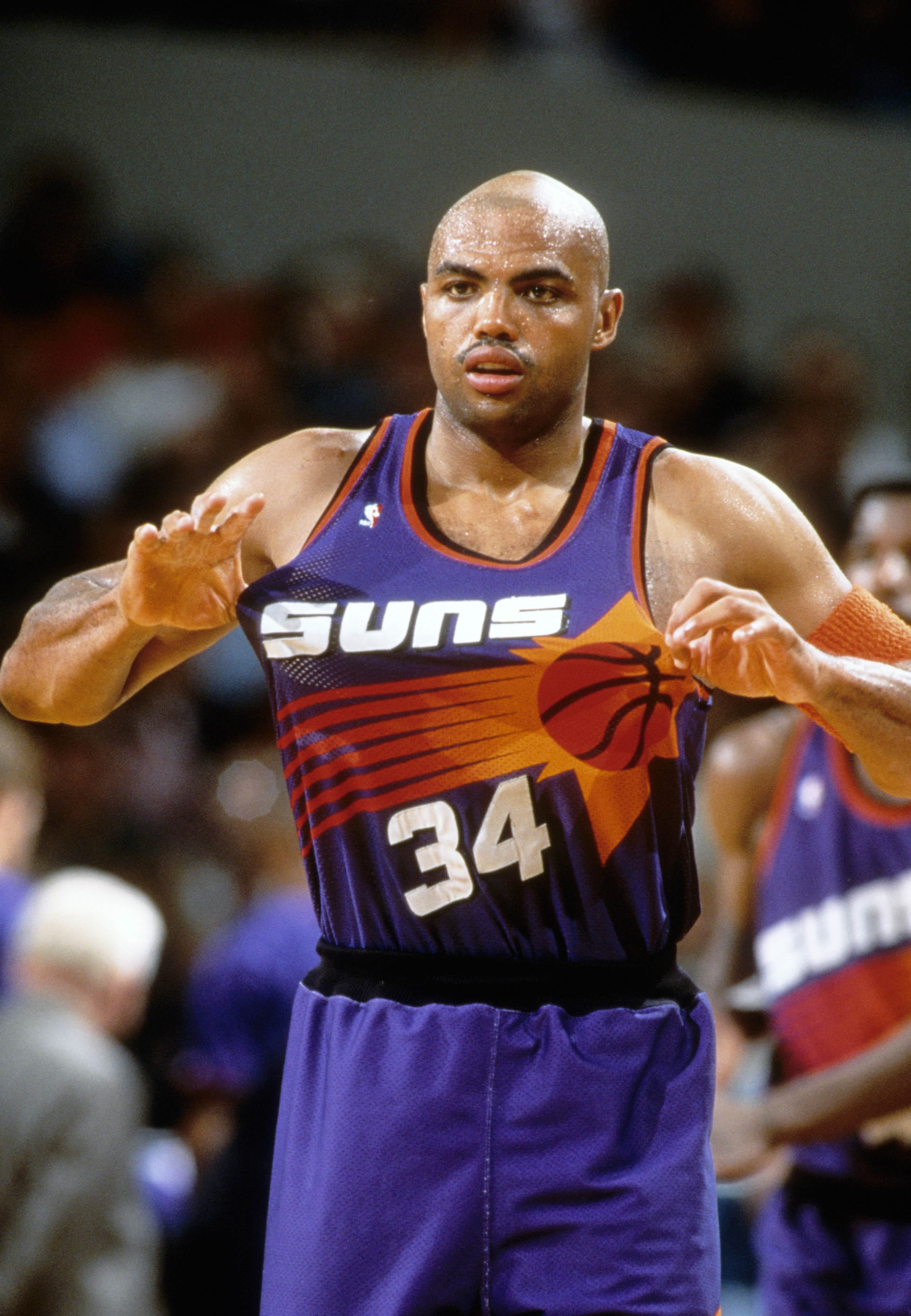
NBA Finals Stats: 27.3 PPG, 13.0 RPG, 5.5 APG, 1.2 SPG, 0.5 BPG
NBA Finals Record: 0-1
Widely regarded as one of the greatest power forwards to ever play the game, Charles Barkley only appeared in 1 NBA Finals series in his career. The year was 1993 and Barkley was in his first season as a member of the Phoenix Suns after spending 8 seasons with the Philadelphia 76ers. Barkley made an immediate impact, leading the Suns to a 62-20 overall record and winning the MVP award as a result. Barkley averaged 25.6 PPG, 12.2 RPG, 5.1 APG, and 1.7 SPG to capture the MVP and it was on to the playoffs.
The Suns took down the Lakers, Spurs, and SuperSonics en route to the NBA Finals, where Barkley and company would take on Michael Jordan and the Bulls, who were seeking their 3rd straight title. The Suns would drop the first 2 games by a combined total of 11 points before capturing a Game 3 win behind 24 points and 19 rebounds from Barkley. Chicago would win 2 out of the next 3 games to capture their 3rd title in a row, but Barkley put up a hell of a fight. He averaged 27.3 PPG, 13.0 RPG, 5.5 APG, and 1.2 SPG in the 6-game series and the only Finals games he would ever participate in.
Giannis Antetokounmpo
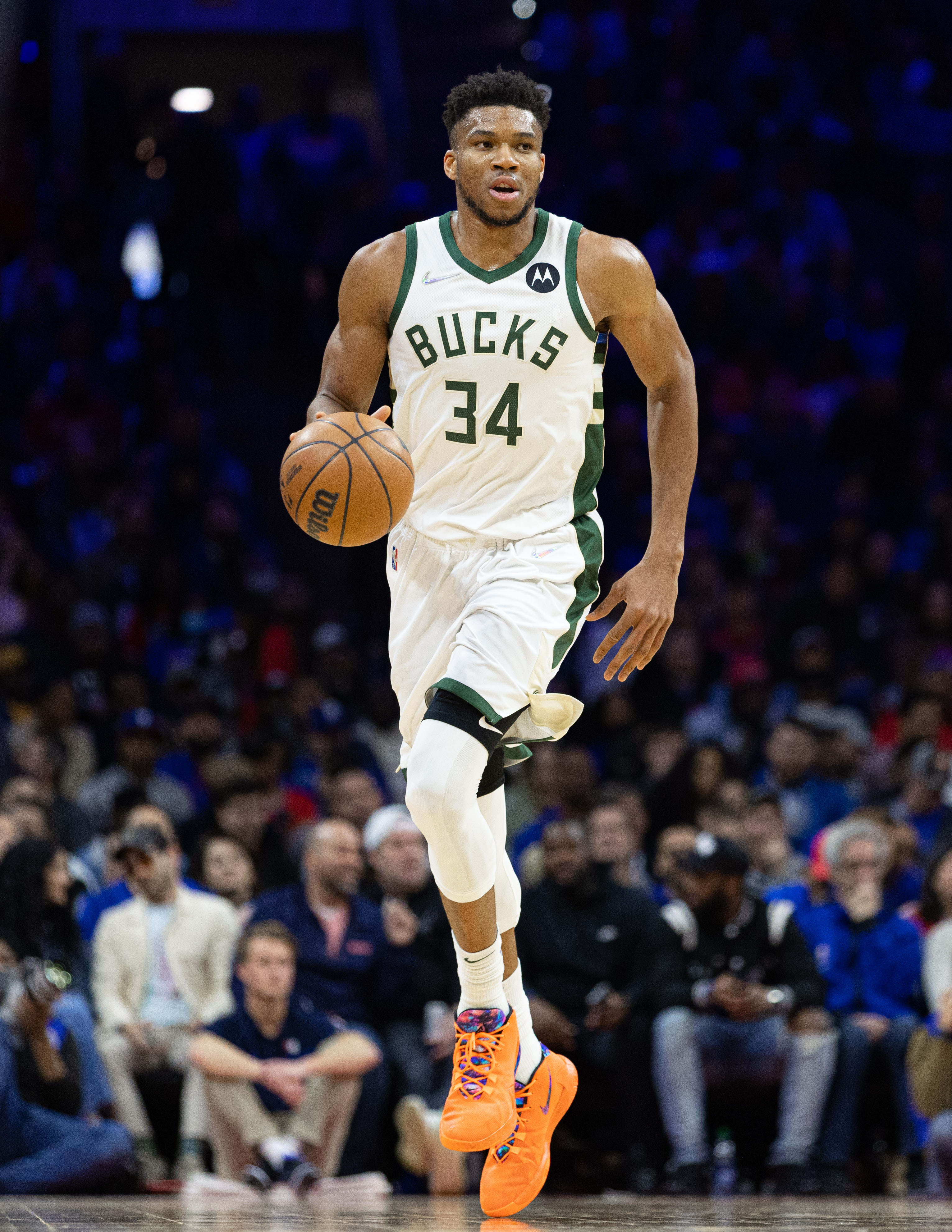
NBA Finals Stats: 35.2 PPG, 13.2 RPG, 5.0 APG, 1.2 SPG, 1.8 BPG
NBA Finals Record: 1-0
As it stands in 2022-23, Giannis Antetokounmpo is the consensus best player in the world. The narrative for Giannis to be No. 1 began in 2019 when he captured his first of 2 straight MVP awards. He has had the greatest impact on both sides of the ball of any player in basketball over the past 4 seasons and has led the Bucks to places they have not been as a team in 50 years. In 2021, Giannis once again challenged for the MVP award but fell short of Nikola Jokic. He led the Bucks to a 46-26 record and the 3rd seed for the Eastern Conference in the playoffs.
The playoffs were a grind as star players were dropping like flies left and right due to injuries. The Bucks swept the Heat in the first round and defeated the Nets in 7 games in the following round. In the Eastern Conference Finals, Giannis and the Bucks defeated the Hawks in 7 games to reach the NBA Finals. After dropping the first 2 games of the series to Phoenix with a hobbled and clearly tired Giannis, the Bucks responded. Antetokounmpo dug deep and helped the Bucks rattle off 4 straight wins to capture their first NBA championship in 50 years. Giannis capped off the series by recording 50 points, 15 rebounds, and 5 blocks to claim the Finals MVP award.
David Robinson
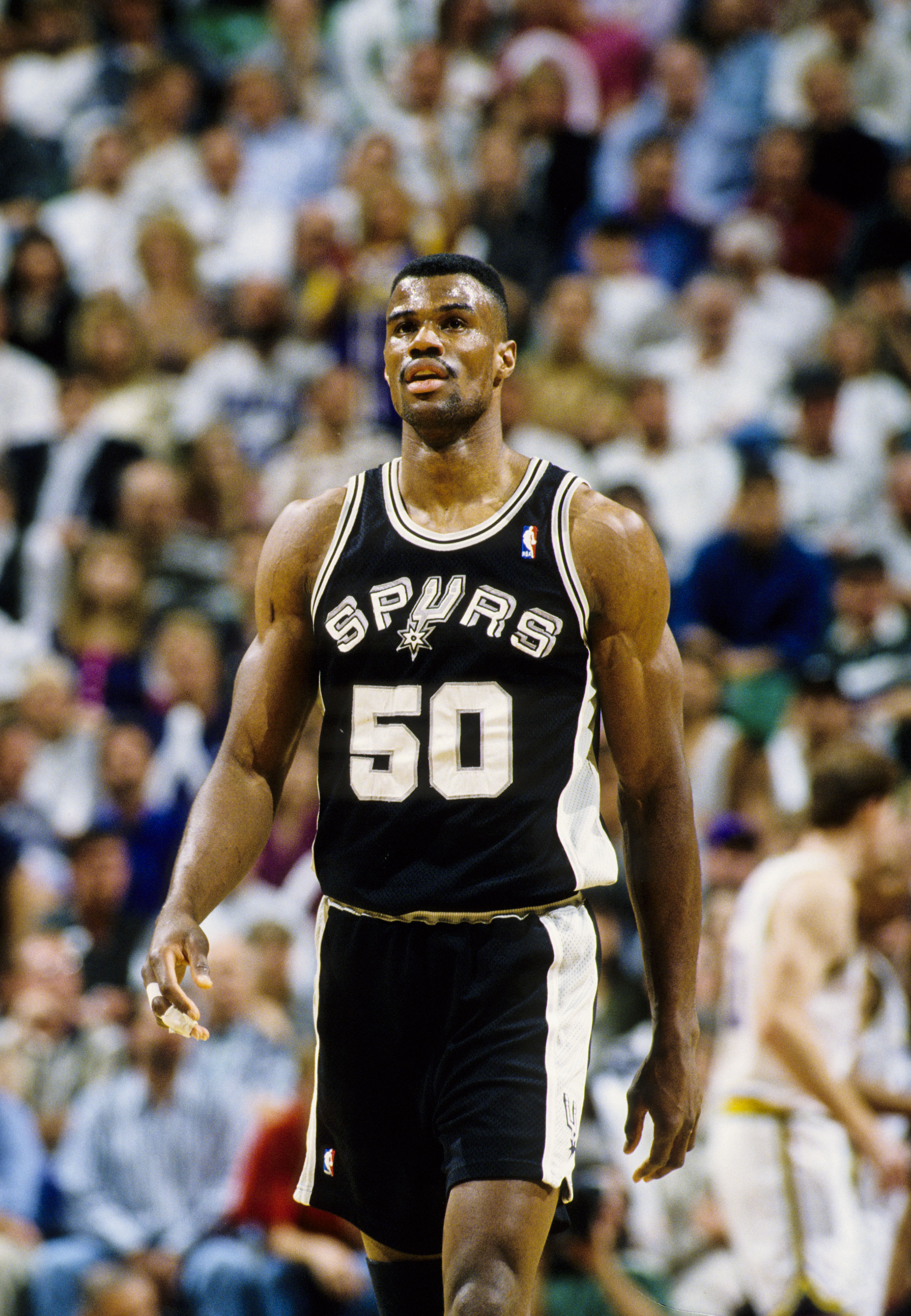
NBA Finals Stats: 13.5 PPG, 9.4 RPG, 1.5 APG, 1.1 SPG, 2.4 BPG
NBA Finals Record: 2-0
During the 1990s, David Robinson was one of the best centers in basketball. During his rookie season, the Spurs improved their win total from the previous season by over 30 games. He would go on to win the 1995 MVP award and the 1992 Defensive Player of the Year award in just his 3rd season. Robinson was simply one of the most athletically gifted and all-around skilled big men in basketball and his two-way dominance was on display every single night. The one thing missing from his resume was an NBA championship.
In 1998, the Spurs drafted Tim Duncan out of Wake Forest 1st overall. By 1999, the Spurs were title contenders with their version of the twin towers leading the way. The Spurs defeated the Knicks in the 199 NBA Finals, with Duncan receiving the Finals MVP award. Robinson played a large role as well with 16.6 PPG, 11.8 RPG, and 3.0 BPG. By 2003, Robinson was on the last legs of his career and could barely step on the court. Still, he was able to have an impact on the defensive side of the ball as the Spurs captured their 2nd title defeating the New Jersey Nets. Robinson rode off into the sunset after the series with 2 rings added to an amazing career.
Elgin Baylor
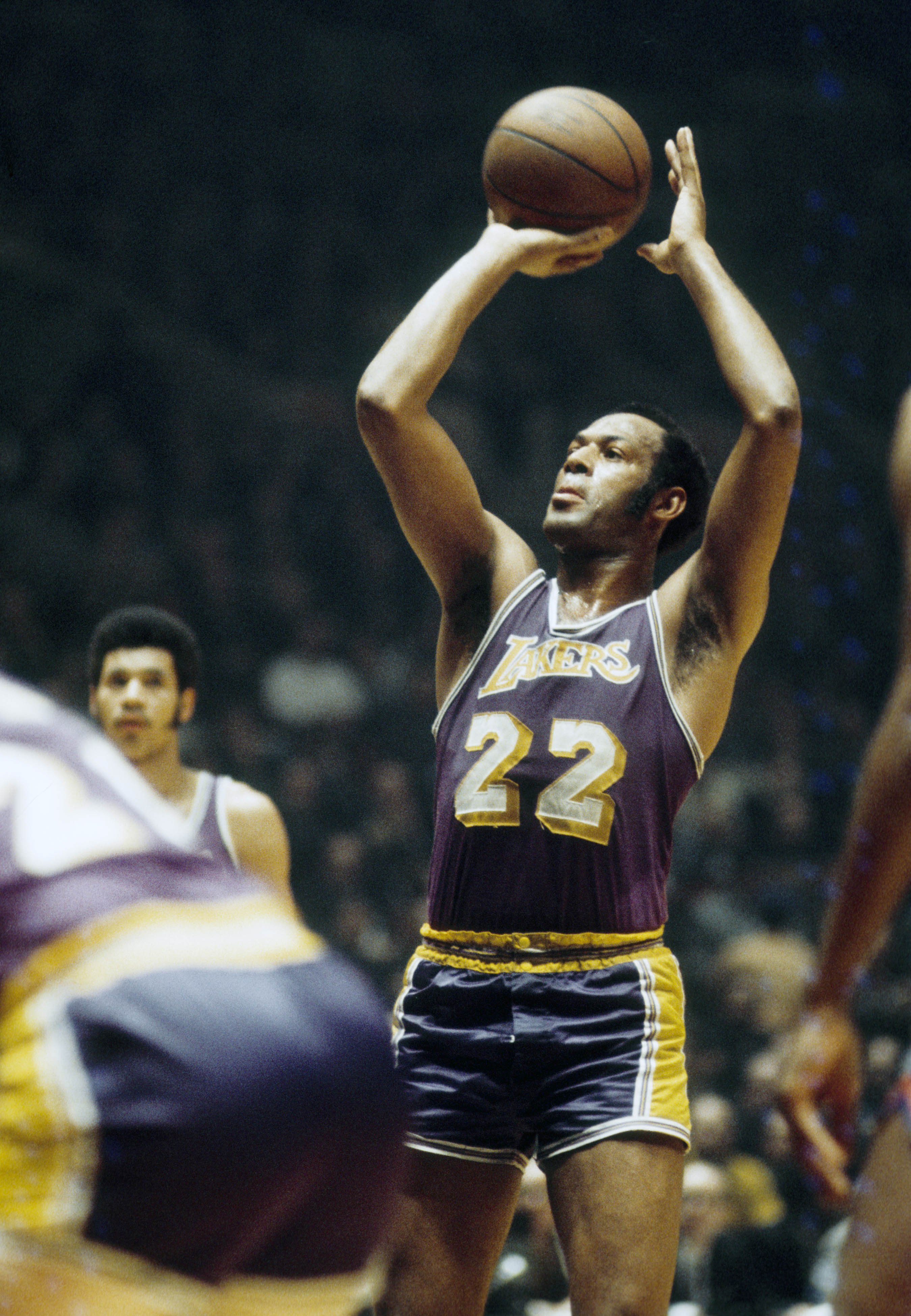
NBA Finals Stats: 26.4 PPG, 13.5 RPG, 4.3 APG
NBA Finals Record: 0-7
Probably the worst case of a player being underrated due to the lack of a championship is Elgin Baylor. As a part of the great Celtics-Lakers rivalry of the 60s, Baylor helped lead the Lakers to the Finals against Boston in 6 out of the 7 times he went to the Finals in his career. in his NBA career. The only exception to Baylor’s inability to conquer the Celtics is his loss to the Knicks in 1970. Baylor is one of the first real superstars in NBA history as he played above the rim and at a fast pace that made it nearly impossible for television cameras to keep up with in those days.
Listen, Baylor’s losses certainly didn’t come from a lack of trying. Baylor still holds the single-game Finals record with 61 points and has 19 30-point games in 44 total games. Alongside Jerry West, Baylor and the Lakers could never contend with Bill Russell’s Celtics and were outplayed in 1970 by the Knicks with effort. Even with his Finals shortcomings, Baylor is still one of the greatest small forwards in NBA history and it is time to recognize him as so.
Dirk Nowitzki
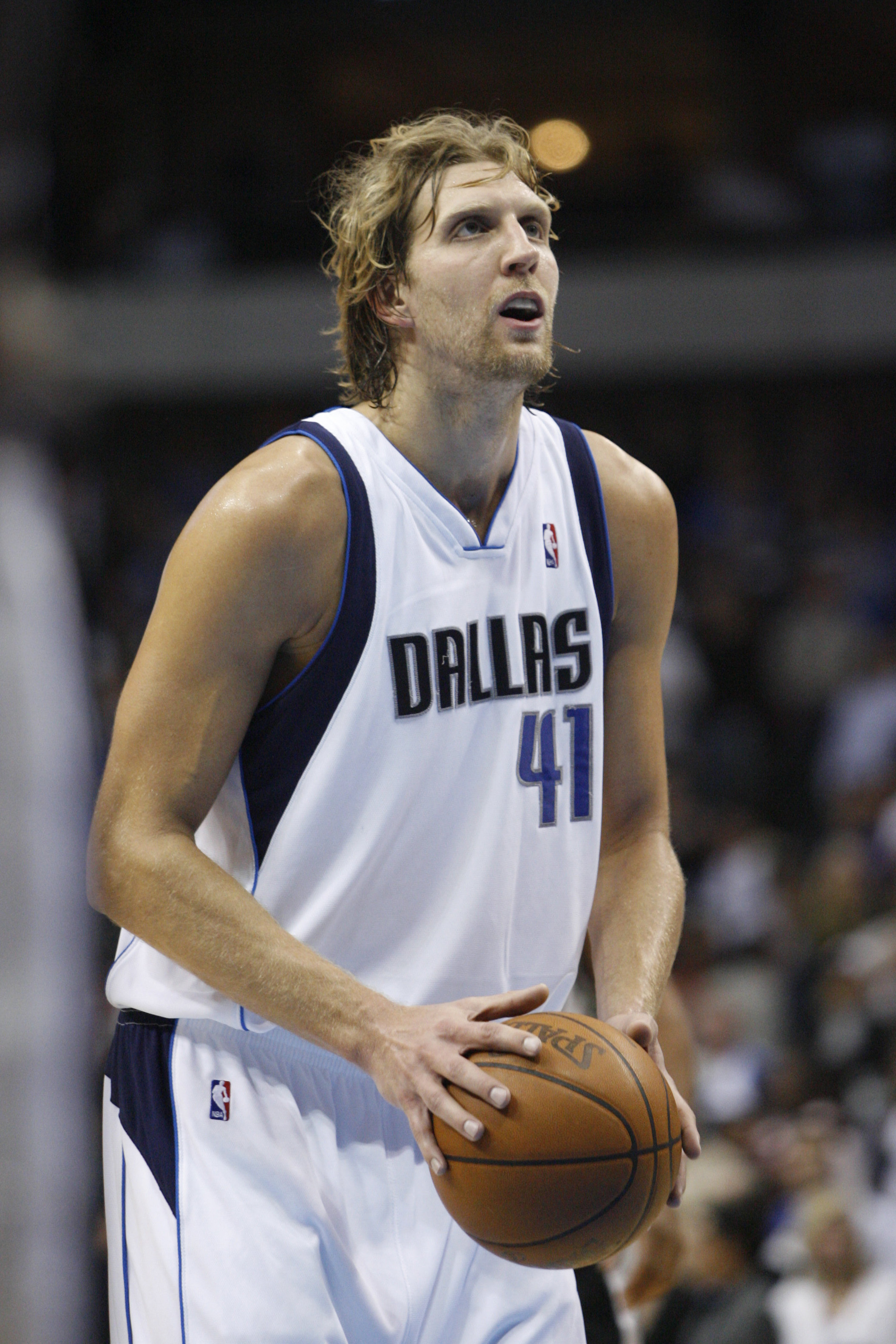
NBA Finals Stats: 24.4 PPG, 10.3 RPG, 2.3 APG, 0.7 SPG, 0.7 BPG
NBA Finals Record: 1-1
During his peak, Dirk Nowitzki was one of the greatest offensive power forwards in NBA history. At 7’0’’, Nowitzki became a unicorn for the way he was able to knock down outside shots and his patented one-legged fadeaway in the post at an exceptional rate. Nowitzki became an MVP of the league and an icon for a generation of Dallas Mavericks fans. His legacy was cemented on one special playoff run in 2011 that netted the Mavericks their only championship in team history.
The 2011 NBA Finals was not the first time that Nowitzki appeared on the big stage. In 2006, Dirk led the Mavericks to the NBA Finals against Dwyane Wade, Shaquille O’Neal, and the Miami Heat. After taking a 2-0 series lead, Nowitzki and the Mavericks let the championship slip through their grapes as the Heat won 4 straight games. In 2011, Nowitzki and the Mavericks to the NBA Finals once against the Miami Heat. This time, it would be Wade, LeBron James, and Chris Bosh in opposition. Nowitzki would have one of the most legendary series’ in Finals history he averaged 26.0 PPG and 9.0 RPG to claim Finals MVP and take down the Heat in 6 games.
Julius Erving
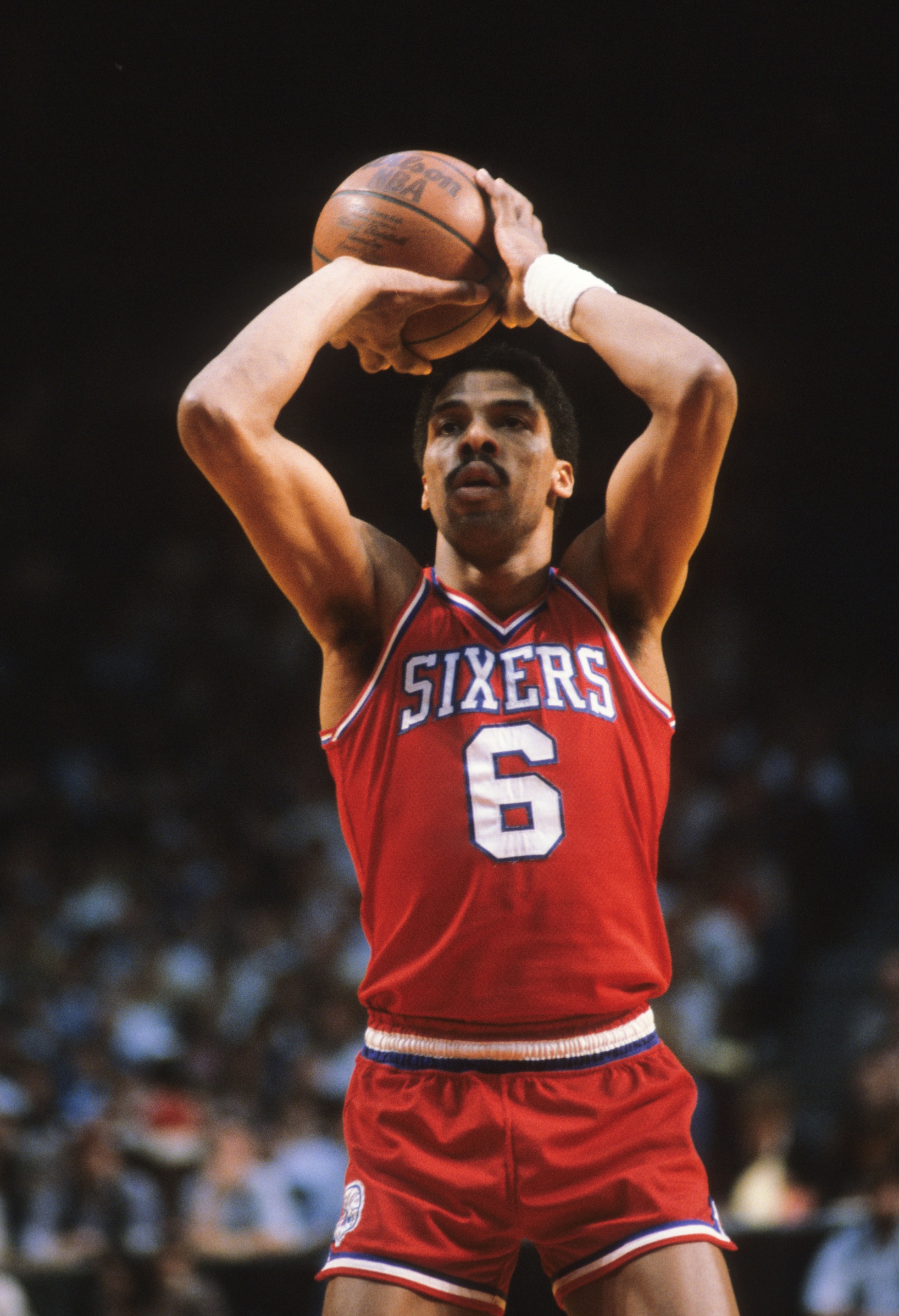
NBA Finals Stats: 25.5 PPG, 7.5 RPG, 4.5 APG, 2.0 SPG, 1.8 BPG
NBA Finals Record: 1-3
During the late 70s and early 80s, Julius Erving was one of the must-see superstars in the game. With his incredible athleticism and elite skill, Erving and the Philadelphia 76ers were consistent contenders for the NBA championship from 177 through 1984. Erving first took the 76ers to the Finals in 1977 vs. the Trail Blazers. Philly would blow a 2-0 series lead to Portland despite 30.3 PPG, 6.8 RPG, 5.0 APG, 2.7 SPG, and 1.2 BPG from Erving. Erving and the 76ers would fall in the NBA Finals in both 1980 and 1982 as well, despite big performances from Erving.
In 1983, the Sixers gave Erving a monumental boost in help when they added 2-time MVP Moses Malone, who would win his 3rd MVP that very season. Erving, Malone, and the Sixers coasted to the NBA Finals for their 3rd matchup with the Los Angeles Lakers in 4 seasons. The Sixers were far too powerful for Los Angeles as they swept them in 4 games. Erving was not named Finals MVP but had a great series with 19.0 PPG, 8.5 RPG, 5.0 APG, 1.3 SPG, and 2.8 BPG. After 3 Finals of heartbreak for Julius Erving, he was finally able to break through for the only championship of his career.
Kevin Garnett
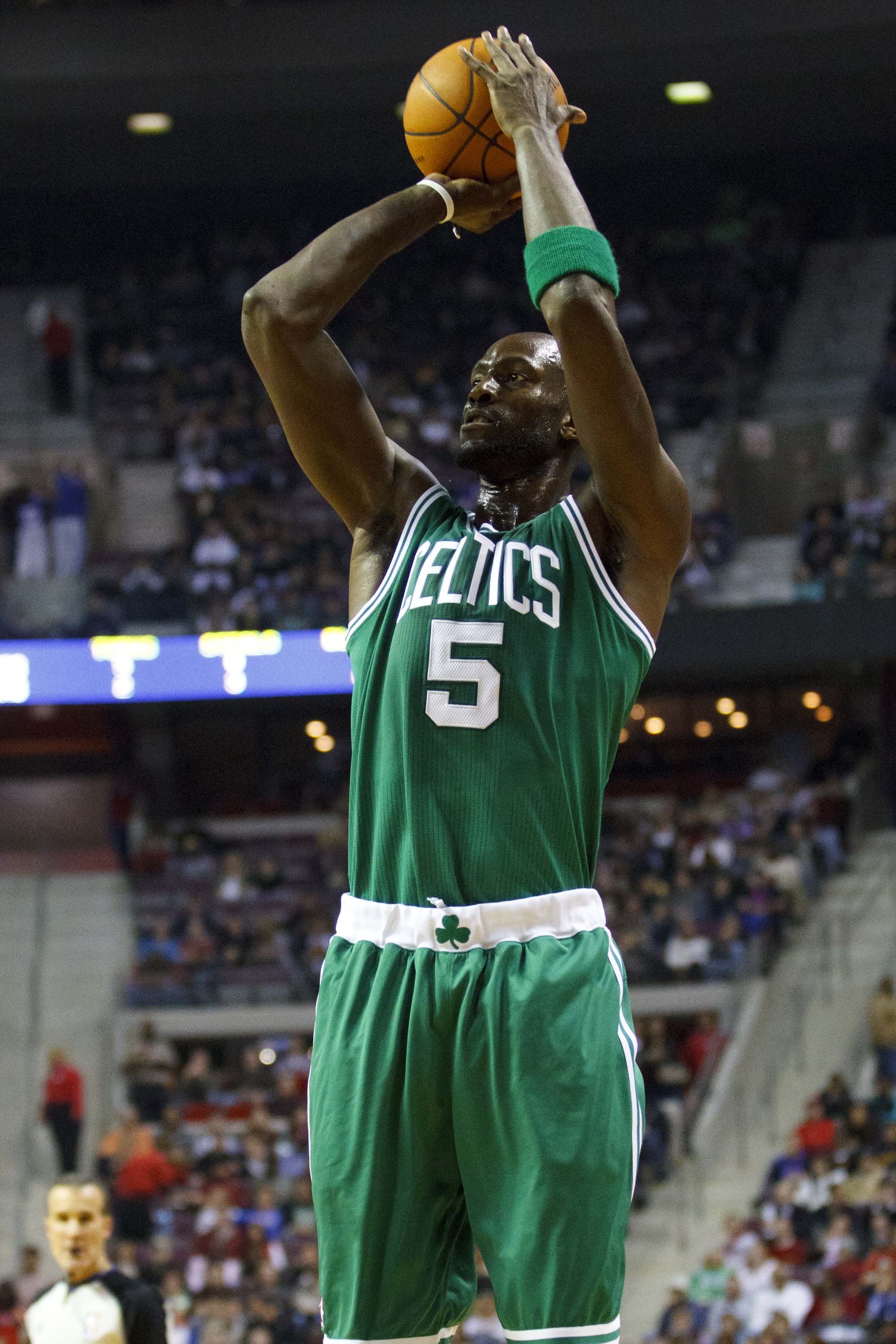
NBA Finals Stats: 16.6 PPG, 9.0 RPG, 3.0 APG, 1.5 SPG, 1.2 BPG
NBA Finals Record: 1-1
From 1996-2007, Kevin Garnett was one of the best power forwards in the league with the Minnesota Timberwolves. Garnett won the 2004 MVP award with the Timberwolves and that same season took them to the Western Conference Finals. That would be as far as Garnett advanced with Minnesota, however, due to a lack of organization and talent around him. In July 2007, Garnett was traded from the Timberwolves to the Boston Celtics to team up with Paul Pierce and Ray Allen.
Garnett’s impact was immediately felt on the court as he won the 2008 Defensive Player of the Year award, and the Celtics advanced to the NBA Finals against the Lakers. Garnett and the Celtics would be victorious in 6 games. Garnett would not win Finals MVP, but he had an argument for it with 18.2 PPG, 13.0 RPG, 1.7 SPG, and 1.0 BPG. Garnett and the Celtics would advance to the NBA Finals again in 2010 against the same Lakers they defeated in 2008. This time, it would be the Lakers winning the title in 7 games.
Dwyane Wade
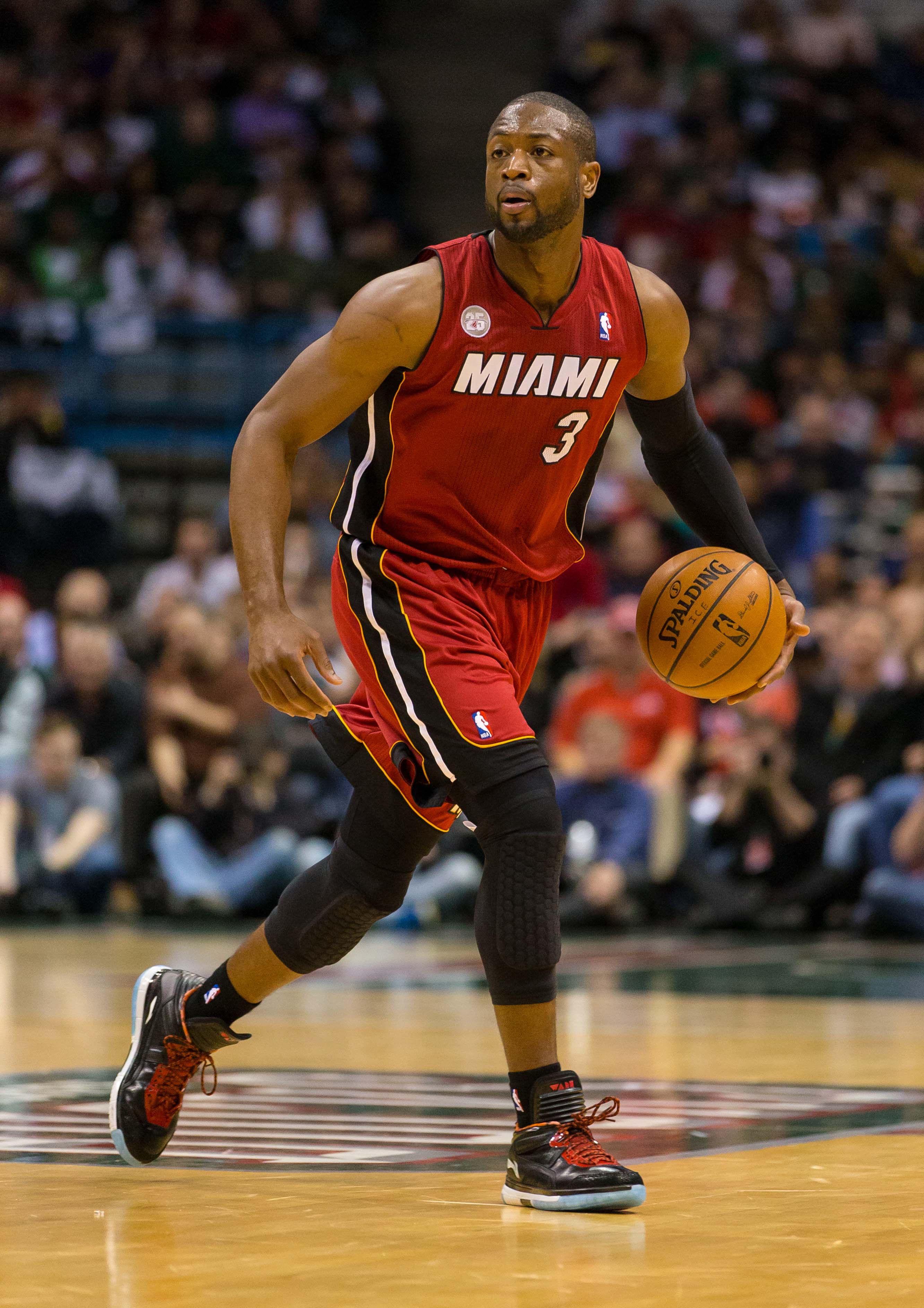
NBA Finals Stats: 23.9 PPG, 5.7 RPG, 4.3 APG, 1.8 SPG, 1.0 BPG
NBA Finals Record: 3-2
In the span of 16 seasons, Dwyane Wade went from a solid prospect out of Marquette to the greatest player in Miami Heat history and one of the top shooting guards of all time. Wade could control an entire game with both his explosive scoring and ability in the open court, as well as his acumen as a strong defender. Wade led the Heat to 5 NBA Finals in his career, but perhaps none were more special than the first one.
In 2006, Wade, along with Shaquille O’Neal, led the Miami Heat to the NBA Finals in a meeting with the Dallas Mavericks. After falling down 2-0 in the series, Wade exploded for 4 straight incredible performances to deliver Miami’s 1st championship. Wade won Finals MVP averaging 34.7 PPG, 7.8 RPG, and 2.7 SPG. Wade and the Heat welcomed LeBron James and Chris Bosh with open arms in 2010-11 and proceeded to advance to 4 straight NBA Finals together. Wade, James, and the Heat would go 2-2 in those 4 Finals, with Wade being a big contributor to their 2 wins.
Moses Malone
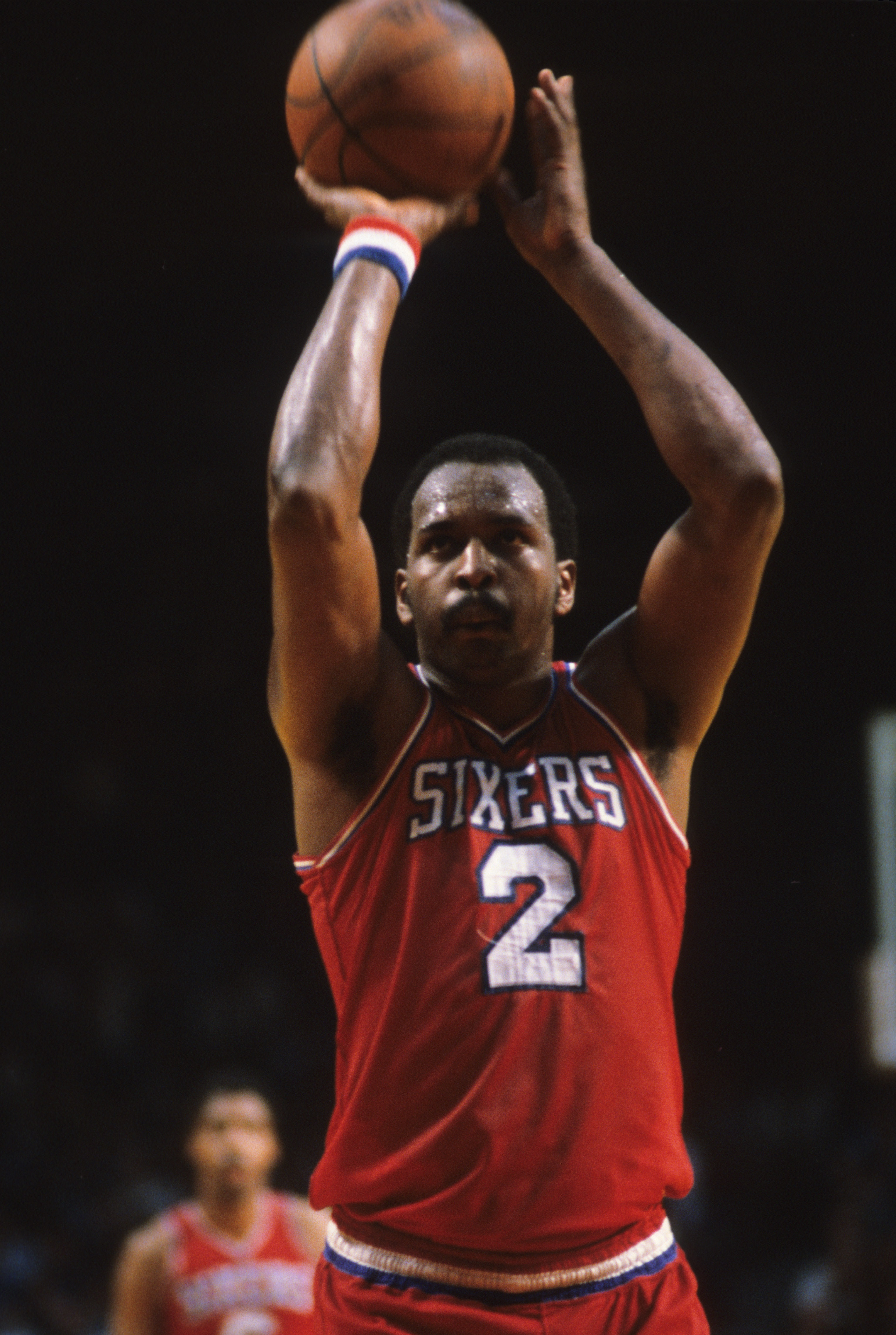
NBA Finals Stats: 23.7 PPG, 16.6 RPG, 1.6 APG, 1.1 SPG, 1.9 BPG
NBA Finals Record: 1-1
As one of the better big men to ever play in the NBA, Moses Malone made instant title contenders of both the Houston Rockets and Philadelphia 76ers in his career. With the Rockets, Malone won 2 MVP awards and helped them advance to the NBA Finals in 1981. In that series against the Celtics, Malone and the Rockets would fall in 6 games. Malone did all he could to carry the Rockets to victory with 22.3 PPG, 15.7 RPG, and 2.2 BPG, but it wasn’t enough to stop Larry Bird, Cedric Maxwell, and the Celtics.
Just 2 seasons later, Moses Malone would be traded from the Rockets to the Philadelphia 76ers. Malone would win the MVP award in his first season, with the Sixers averaging 24.5 PPG, 15.3 RPG, and 2.0 BPG. Malone and the Sixers cruised through the playoffs for a date with Magic Johnson and the Los Angeles Lakers in the NBA Finals. Malone led the Sixers to a sweep of Los Angeles and was named the Finals MVP with 25.8 PPG and 18.0 RPG for the series.
Karl Malone
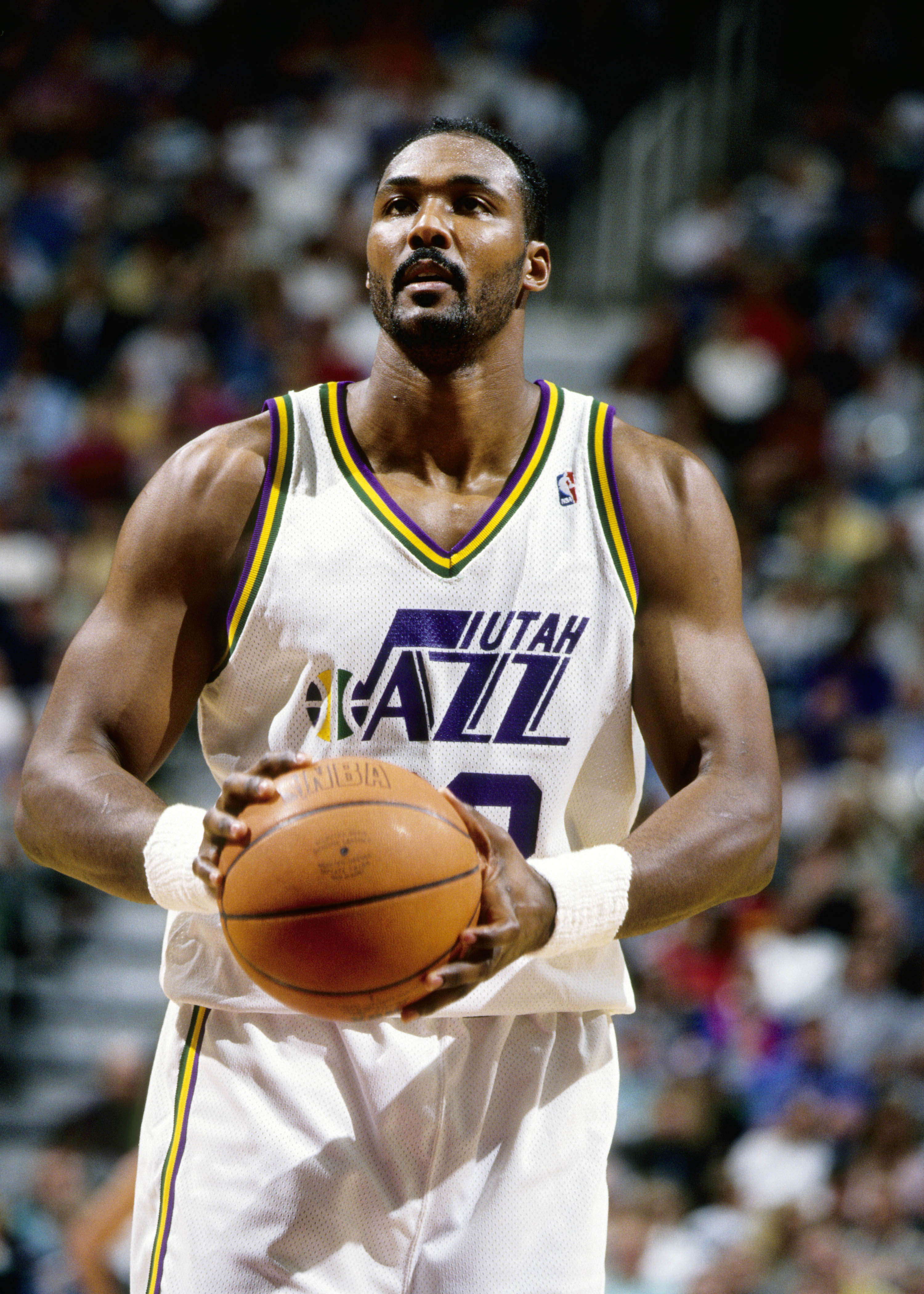
NBA Finals Stats: 19.6 PPG, 9.6 RPG, 3.3 APG, 1.1 SPG, 0.6 BPG
NBA Finals Record: 0-3
During the 1990s, Karl Malone established himself as one of the greatest players in Utah Jazz history, as well as a top power forward in NBA history. Malone would go on to win 2 MVP awards with the Utah Jazz and is currently the game’s 3rd all-time leading scorer. Together with John Stockton, Malone would help the Jazz advance to back-to-back NBA Finals in 1997 and 1998. The only problem is they ran into the buzzsaw known as Michael Jordan and the Chicago Bulls of the 90s.
In 1997, Malone was named MVP of the league and helped Utah reach the first NBA Finals in NBA history. Michael Jordan and the Bulls would take down Utah in 6 games despite a 23.8 PPG, 10.3 RPG, and 1.7 SPG effort from Malone. In 1998, Malone and the Jazz went back to the NBA Finals with much more optimism against the Bulls. That optimism was dashed when Jordan and the Bulls won in 6 games once again. Malone gave it everything with 25.0 PPG, 10.5 RPG, 1.2 SPG, and 1.0 BPG. Malone would be a part of his 3rd Finals-losing team in 2004 with the Los Angeles Lakers. The Lakers would lose to the Pistons that season and Malone would finally call it quits at 40 years old.
Jerry West
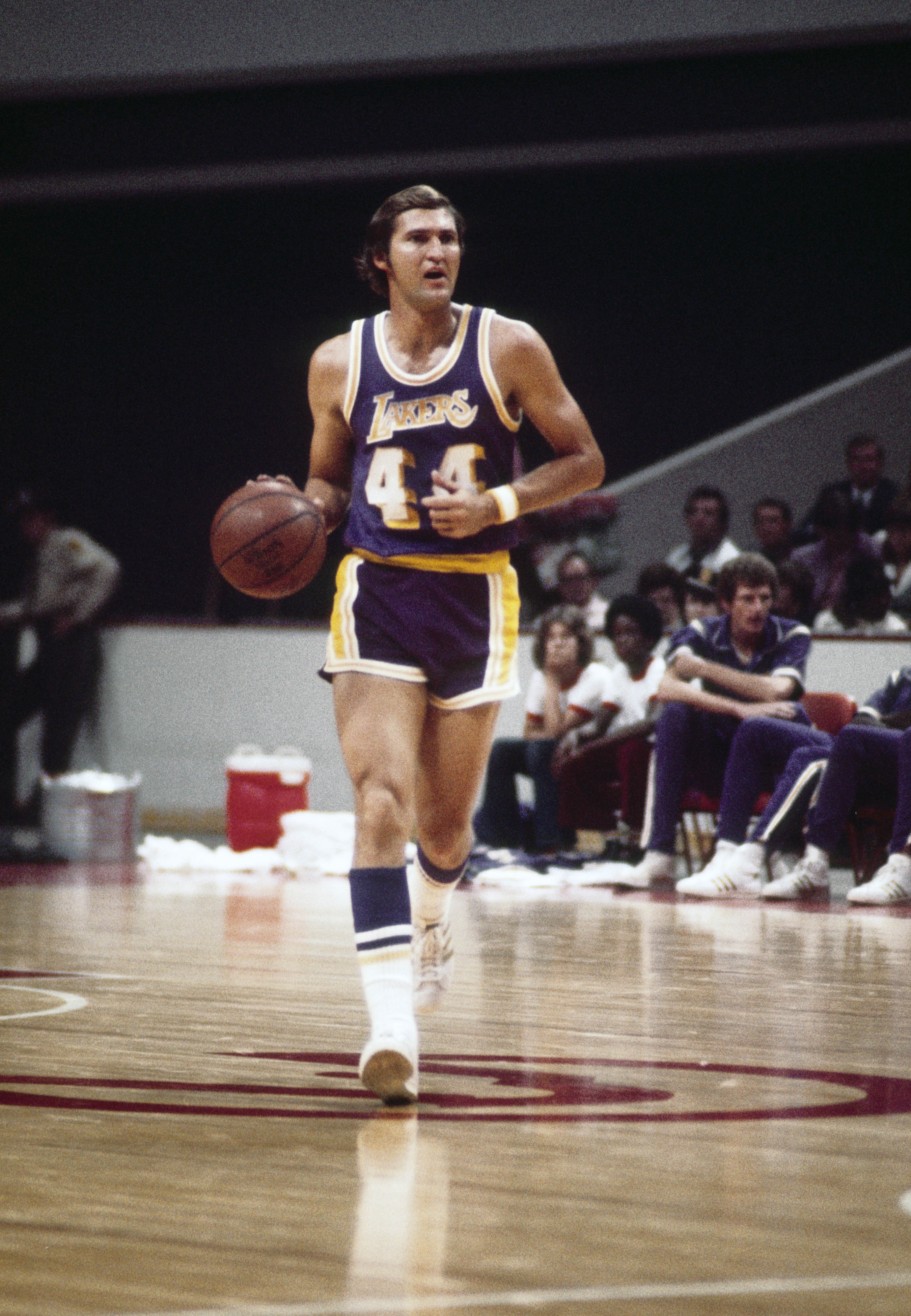
NBA Finals Stats: 30.5 PPG, 5.0 RPG, 5.6 APG
NBA Finals Record: 1-8
Jerry West is one of the most perfect examples of a team record that doesn’t equal individual greatness. Jerry West is one of the best Finals performers in basketball history, as he led his Lakers to the final round 9 times during his NBA career. West’s 8 losses were to 2 of the greatest teams ever, Bill Russell’s Celtics and Willis Reed’s New York Knicks. West was still able to show up on the big stage time and time again but was never able to conquer the giants at the very end.
West owns the 3rd-most career PPG in Finals history with a 30.5 PPG average in 55 career Finals games. In 1969, he became the only player in NBA history to win the Finals MVP on the losing team in the series. West averaged 37.9 PPG, 4.7 RPG, and 7.4 APG in the 7-game series loss. West and the Lakers were finally able to get over the proverbial championship hum in 1972 against the New York Knicks. Wilt Chamberlain would be named Finals MVP, but West was the teams leading assist man with 8.8 APG while adding 19.8 PPG.
Oscar Robertson
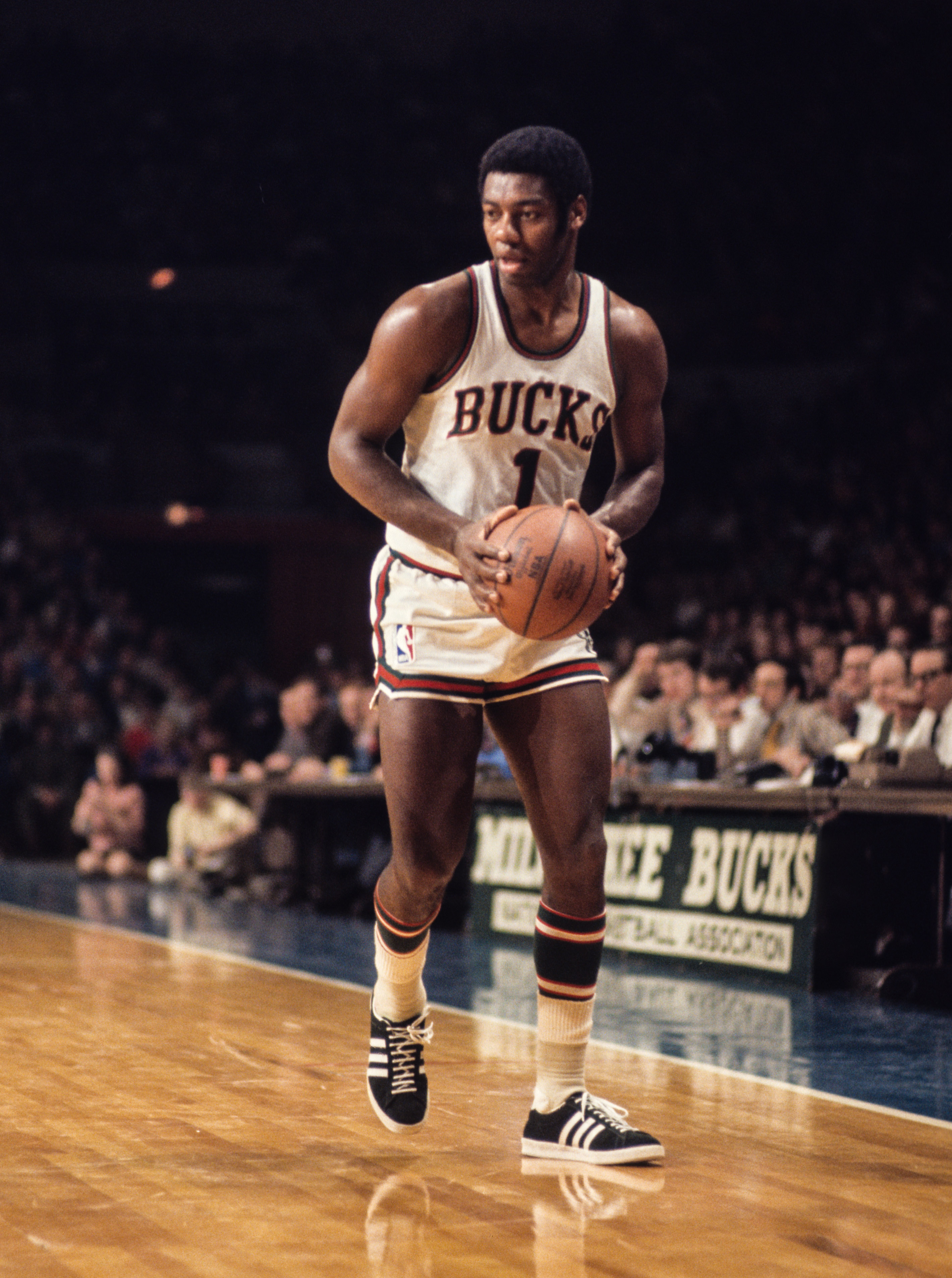
NBA Finals Stats: 16.3 PPG, 4.2 RPG, 8.7 APG, 0.3 SPG, 0.0 BPG
NBA Finals Record: 1-1
Oscar Robertson became one of the best point guards in NBA history early on in his career with the Cincinnati Royals. He was the first player in NBA history to average a triple-double for an entire season in 1962 and was named the MVP in 1964. He won 7 assists titles and 1 scoring title with the Royals but was never able to push them over the top into an NBA champion. Robertson’s luck would change when he was traded to the Milwaukee Bucks to play with Kareem Abdul-Jabbar.
In their first season together as teammates, Robertson and Kareem would help the Bucks win 66 games and advance to the NBA Finals. The Bucks took on the Bullets in the Finals and, behind Kareem and Oscar, finished them off in 4 games. Kareem would be named Finals MVP, but Oscar played outstanding with 23.5 PPG, 5.0 RPG, and 9.5 APG. Robertson and the Bucks would advance to the NBA Finals again in 1974, this time against the Boston Celtics. Boston would defeat Milwaukee in 7 games. Robertson was no longer his dominant self, as he averaged just 12.1 PPG and 8.3 APG for the series.
Kevin Durant
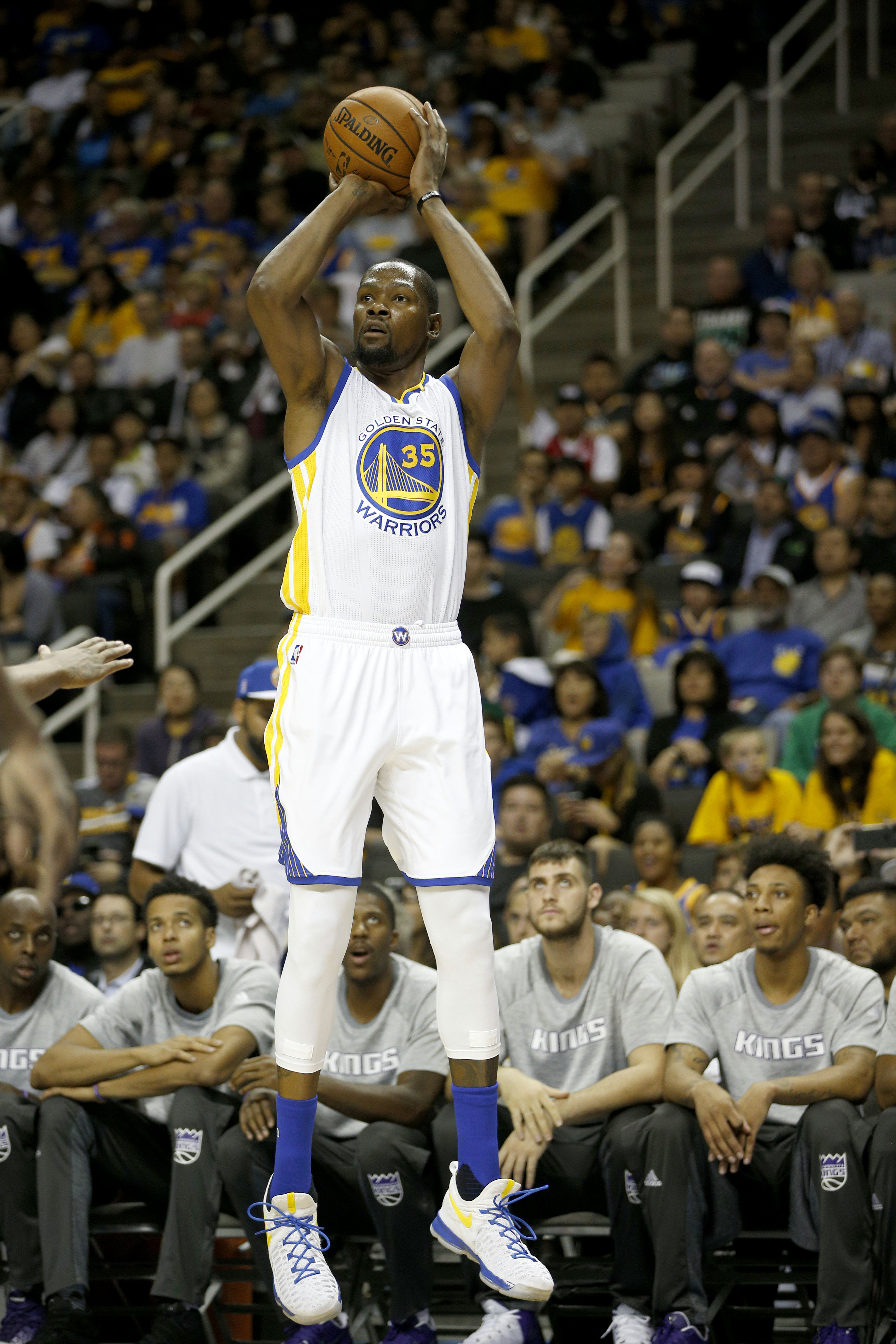
NBA Finals Stats: 30.3 PPG, 7.7 RPG, 4.5 APG, 1.0 SPG, 1.5 BPG
NBA Finals Record: 2-2
Kevin Durant is a 6-foot demi-god who can handle the ball like a guard and score at will from wherever he wants. These abilities led him to become a 4-time scoring champion, an MVP, and an all-time great Finals performer. Durant got his first taste of the NBA Finals in 2012 vs. the Miami Heat. Durant and the Thunder would fall in 6 games to Miami, but Durant did his best with 30.6 PPG, 6.0 RPG, and 1.4 SPG. Just over 4 years later, Durant would spurn the Thunder for the Golden State Warriors, where he would make his mark on NBA Finals history forever.
In his first season with the Warriors, Durant and company cruised into the NBA Finals against LeBron James and the Cleveland Cavaliers. Durant and the Warriors would run over the Cavs in 5 games, with Durant winning Finals MVP behind 35.2 PPG, 8.2 RPG, and 5.4 APG. The following season, Durant and the Warriors met the Cavaliers once more in the NBA Finals. This time, Durant claimed Finals MVP in a 4-game sweep with 28.8 PPG, 10.8 RPG, and 7.5 APG. The Warriors would advance to one more NBA Finals with Durant on the team, but Durant played a total of 12 minutes in the series before tearing his Achilles, and the Warriors lost to the Raptors in 6 games.
Hakeem Olajuwon
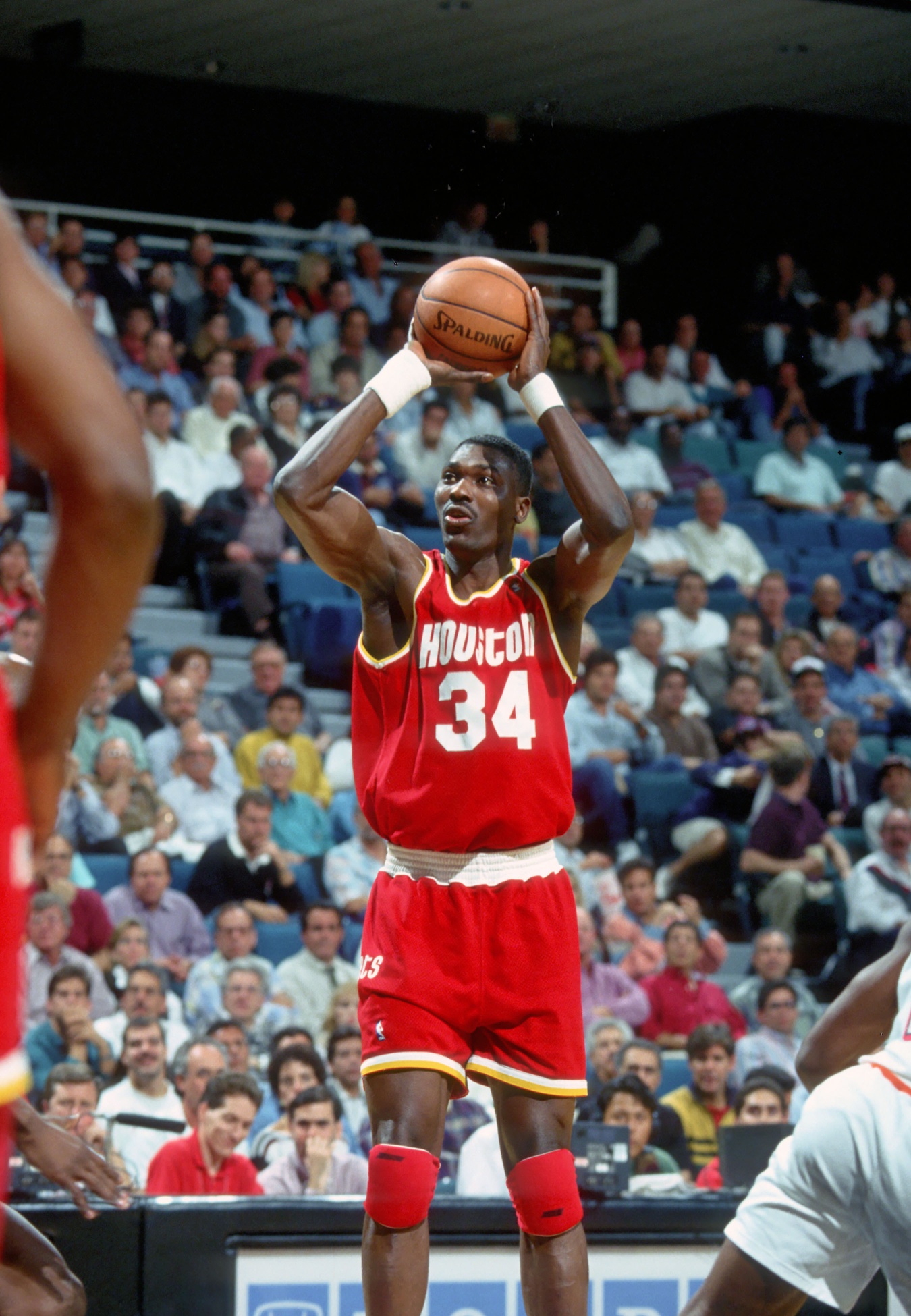
NBA Finals Stats: 27.5 PPG, 10.6 RPG, 3.4 APG, 1.9 SPG, 3.2 BPG
NBA Finals Record: 2-1
Hakeem Olajuwon broke into the NBA as a player with incredible versatility and impact on each side of the ball. Olajuwon is considered to be one of the best overall defenders in NBA history and the consensus best big man in the 90s. Olajuwon and the Houston Rockets first got a taste of the NBA Finals in 1986 against the Boston Celtics. Olajuwon and the Rockets would drop that series in 6 games despite 24.7 PPG, 11.8 RPG, 2.3 SPG, and 3.2 BPG from Hakeem.
The 1990s are largely known as Michael Jordan’s decade. For a brief period of time with Jordan off the court in 1994 and 1995, it was Hakeem Olajuwon’s. In 1994, Olajuwon led his Rockets to the NBA Finals against Patrick Ewing and the New York Knicks. Olajuwon led the Rockets to the NBA title in 7 games and won the Finals MVP award with 26.9 PPG, 9.1 RPG, and 3.9 BPG. Hakeem would lead the Rockets back to the NBA Finals in 1995, where they met Shaquille O’Neal and the Orlando Magic. Once again, Olajuwon destroyed the competition and averaged 32.8 PPG, 11.5 RPG, 2.0 SPG, and 2.0 BPG.
Wilt Chamberlain
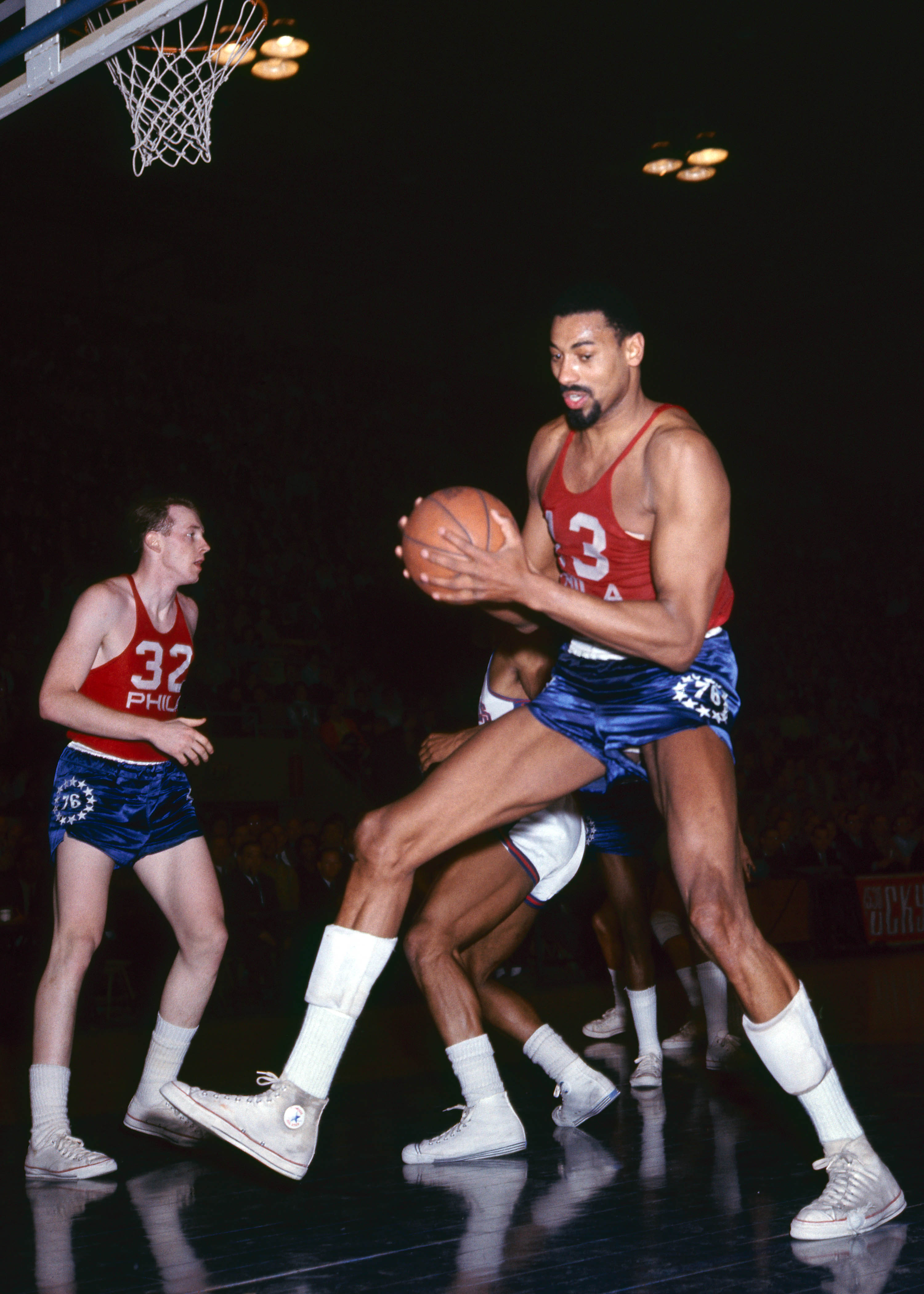
NBA Finals Stats: 24.6 PPG, 18.6 RPG, 3.8 APG
NBA Finals Record: 2-4
Wilt Chamberlain is a Top 3 statistically dominant player in NBA history. During his career, he won 7 scoring titles, 11 rebounding titles, averaged over 50.0 PPG in a season, and 4 MVP awards. In his entire career with the Warriors, Sixers, and Lakers, Chamberlain appeared in 6 NBA Finals with 2 championships to his name. His losses came in 1964, 1969, 1970, and 1973 in the Finals series, while his wins came with the Sixers in 1967 and the Lakers in 1972.
With the Sixers in 1967, Chamberlain was set to take on Rick Barry and his former squad, the San Francisco Warriors. Chamberlain and the Sixers would take care of business in 6 games behind 17.7 PPG and 28.5 RPG. Chamberlain would not achieve victory in the Finals again until 1972 with the Lakers. Chamberlain led the Lakers to a 5-game series win over the Knicks and claimed Finals MVP with 19.4 PPG and 23.2 RPG.
Stephen Curry
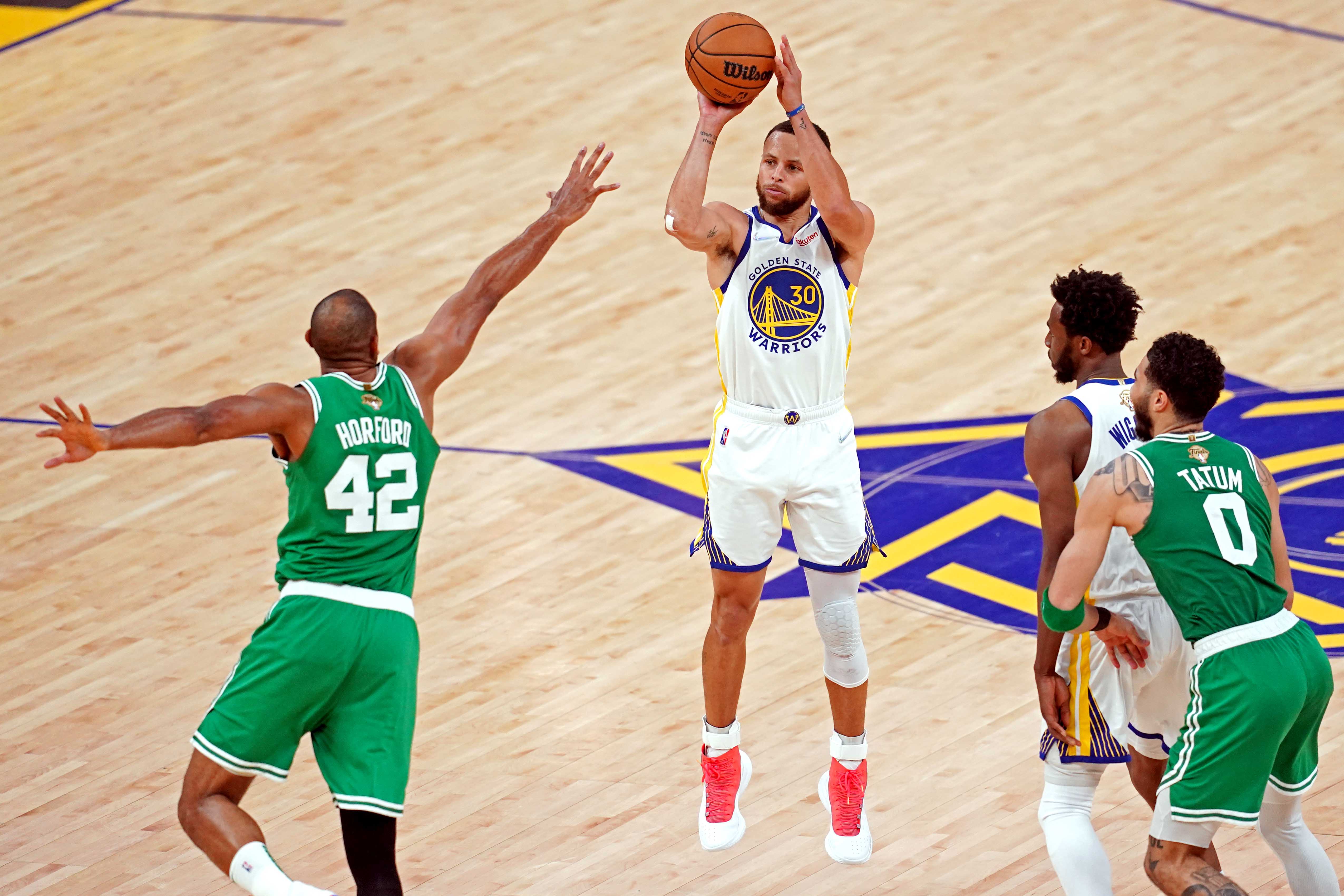
NBA Finals Stats: 27.3 PPG, 5.8 RPG, 6.0 APG, 1.6 SPG, 0.3 BPG
NBA Finals Record: 4-2
Over the last decade, Stephen Curry has changed the way the game is played with his incredible shooting accuracy, range, and volume. Curry has won 2 MVP awards and overtaken Ray Allen as the greatest shooter in NBA history, as well as one of the game’s greatest point guards. In the past 9 seasons, Curry had led the Warriors to 6 total Finals appearances and 4 NBA championship victories.
Stephen Curry and the Warriors captured their first NBA championship in 2015 against LeBron James and the Cleveland Cavaliers. Curry should have probably taken home the Finals MVP award averaging 26.0 PPG and 6.3 APG, but the award went to Andre Iguodala. In 2022, Curry and the Warriors won their 4th NBA championship, and Curry won his first Finals MVP award. Curry and the Warriors took down the Boston Celtics in 6 games behind 31.2 PPG, 6.0 RPG, and 5.0 APG from Curry.
Bill Russell
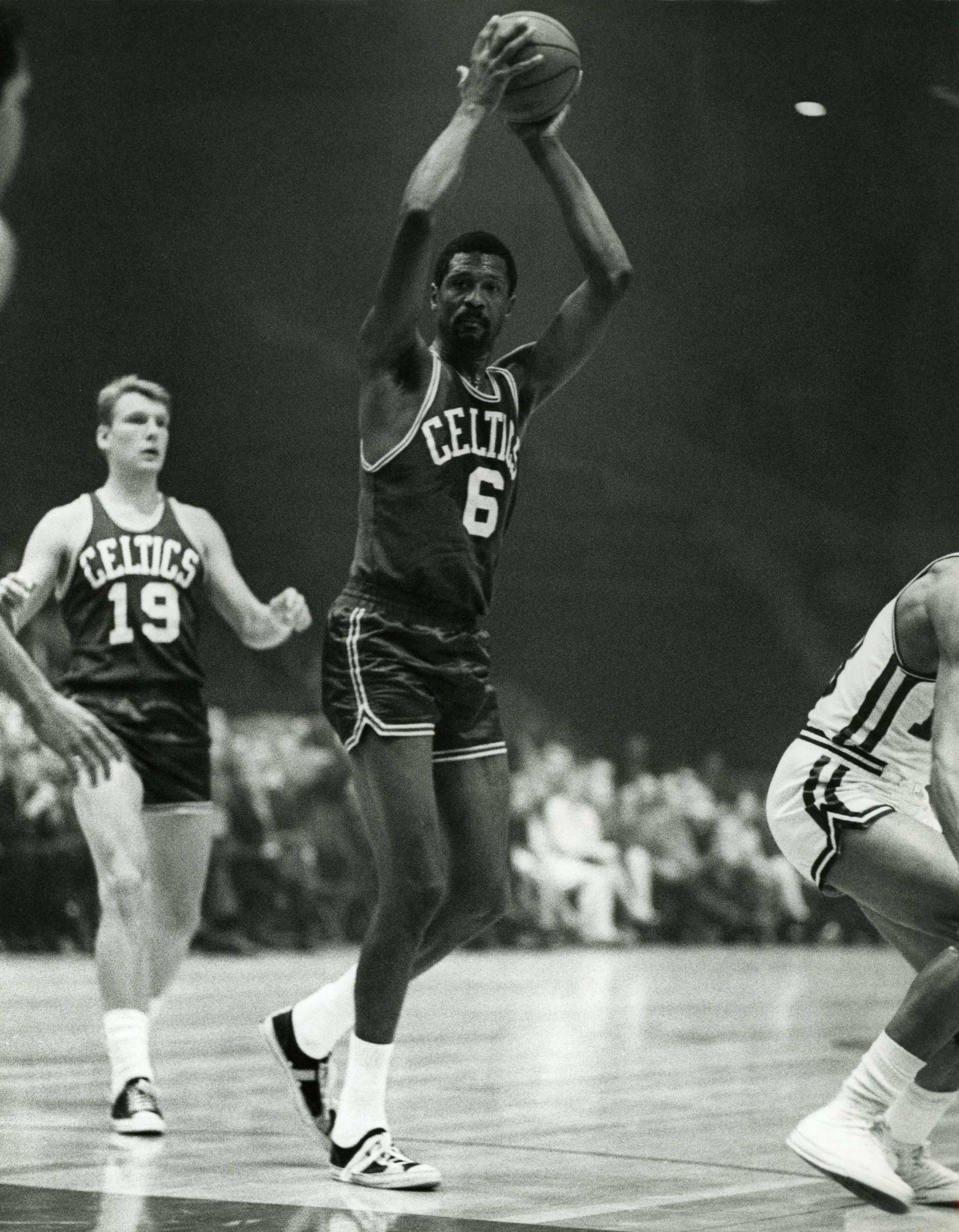
NBA Finals Stats: 16.4 PPG, 24.5 RPG
NBA Finals Record: 11-1
Imagine being so good and such a winner in the NBA that they named the Finals MVP award trophy after you. That is exactly the legacy of Bill Russell, who won 11 championships in 13 seasons as a member of the Boston Celtics. Russell and the Celtics went 11-1 in NBA Finals series during his career, with the 1 loss coming at the hands of Bob Pettit and the Atlanta Hawks. The only time that Russell didn’t reach the NBA Finals in his career was in 1967, when he was defeated by Wilt Chamberlain and the 76ers.
Exactly 7 of Bill Russell’s NBA championships came at the expense of the Los Angeles Lakers. Russell is single-handedly the reason legends like Wilt Chamberlain, Jerry West, and Elgin Baylor do not have more rings. He also beat the Hawks 3 times and the Warriors once in the NBA Finals. Although Russell’s era did not have a Finals MVP award, there is a good chance he would have at least 10 if they did.
Larry Bird
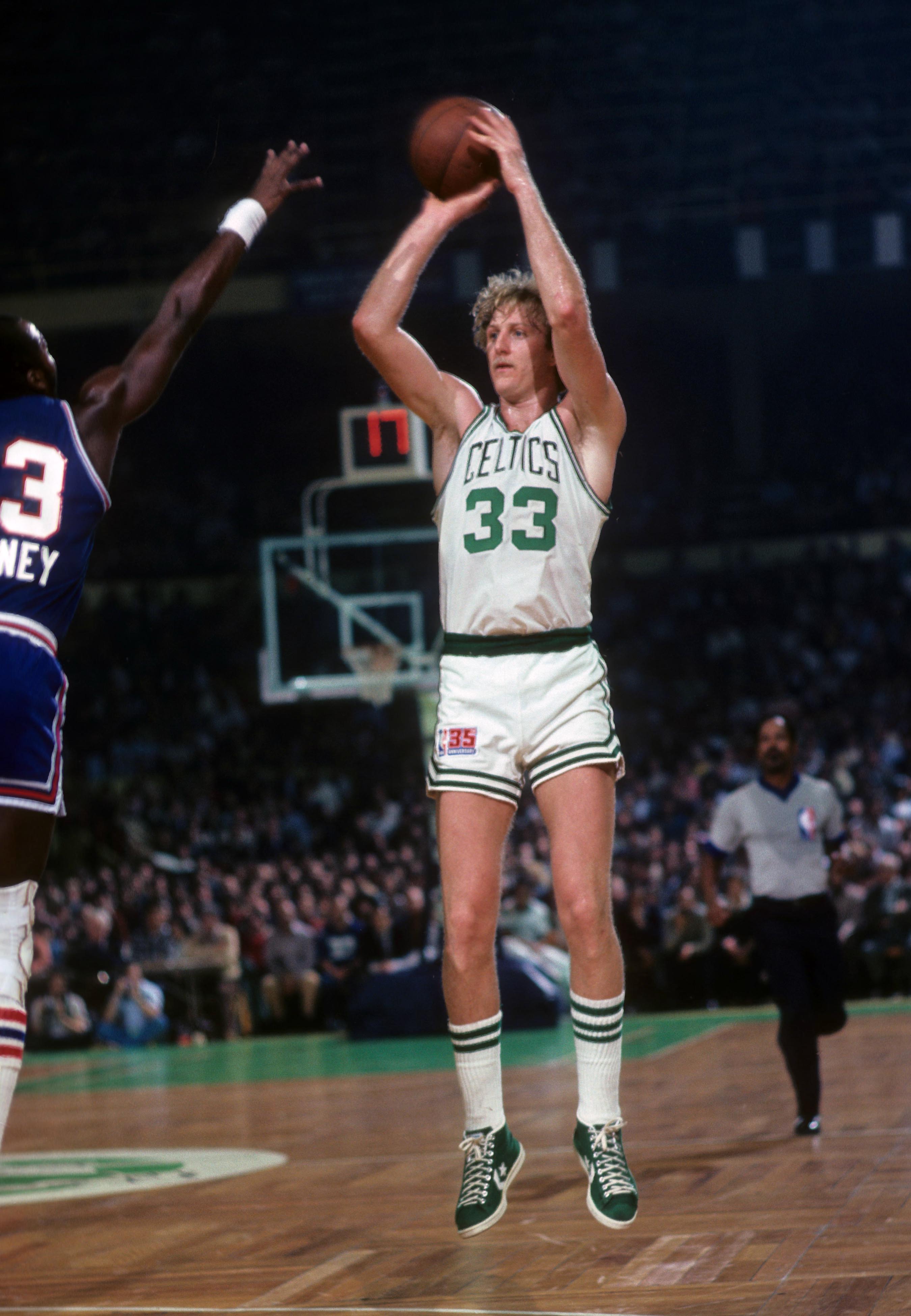
NBA Finals Stats: 23.1 PPG, 11.6 RPG, 6.0 APG, 2.0 SPG, 0.8 BPG
NBA Finals Record: 3-2
Larry Bird is another one of the great NBA Finals performers in NBA history. His rivalry with Magic Johnson helped save the NBA during the early 80s, and it continued throughout their career in the Finals. Bird and the Celtics suffered both of their Finals losses at the Hands of Magic’s Lakers, but they also got the best of LA in 1984. Bird also picked up 2 NBA Finals wins over Houston in 1981 and 1986.
Of the 3 NBA Finals that Bird won, he was named Finals MVP in 2 of them. He won his first Finals MVP in 1984 when he led the Celtics to the NBA title in 7 games over the Lakers. Bird averaged 27.4 PPG, 14.0 RPG, and 3.6 APG in the series win. Bird also took home a Finals MVP award in 1986 when he led the Celtics to an NBA title win over the Rockets. This time, Bird won Finals MVP averaging 24.0 PPG, 9.7 RPG, and 9.5 APG in 6 games.
Tim Duncan
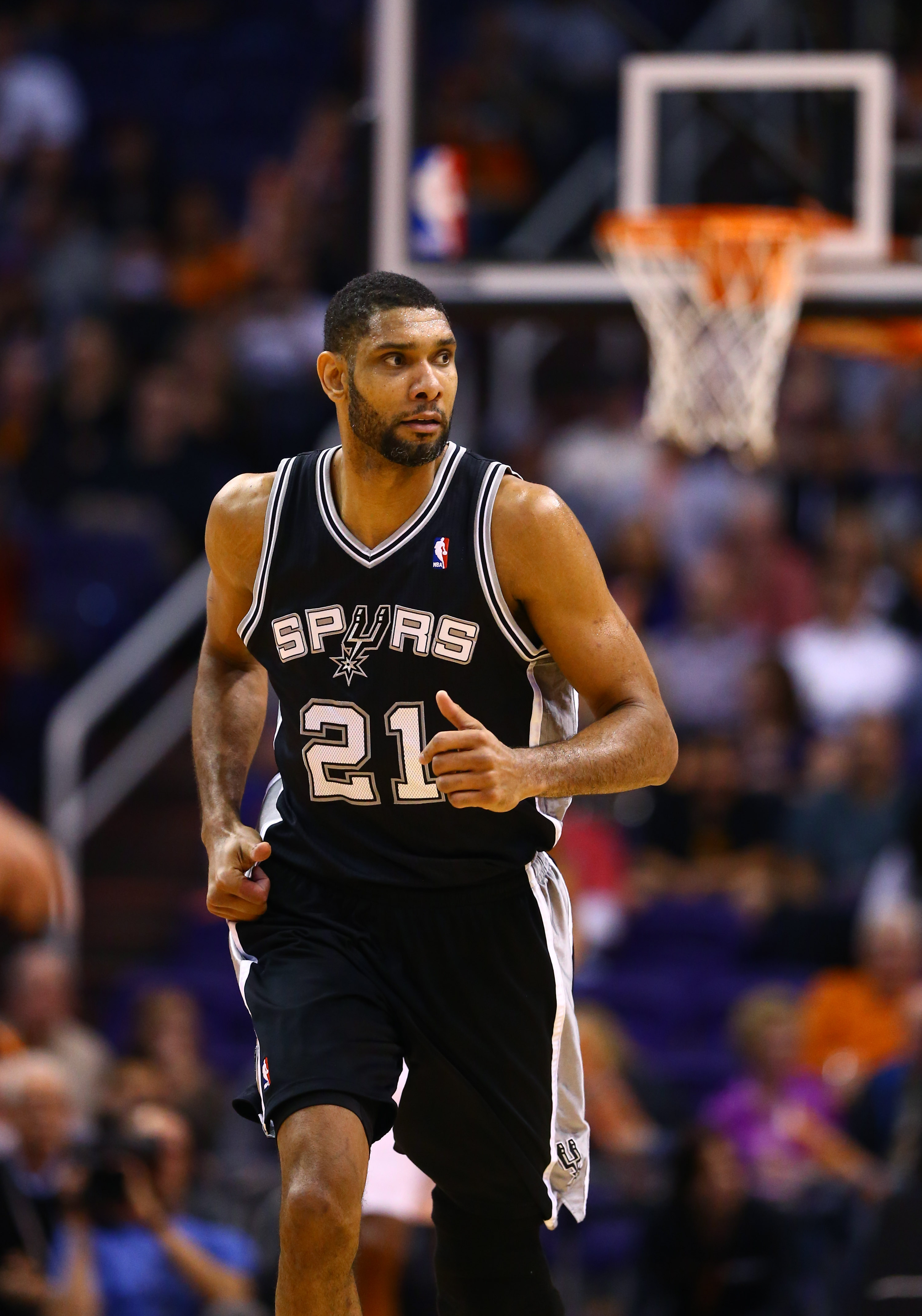
NBA Finals Stats: 20.8 PPG, 13.3 RPG, 2.8 APG, 0.8 SPG, 2.4 BPG
NBA Finals Record: 5-1
The greatest power forward of all time and one of the greatest winners in basketball history is Tim Duncan of the San Antonio Spurs. Duncan led the Spurs to 6 NBA Finals series during his career and established them as a dynasty during the late 90s and early 2000s. Duncan and the Spurs were the only team at the time that proved they could hand with Shaq and the Lakers, and they persevered more times than not. Of the 5 NBA championships that Duncan was a member of the winning team, he earned a Finals MVP nod in 3 of the series.
Duncan won his Finals MVP awards in 1999, 2003, and 2005. He led the Spurs to their first NBA championship in history in 1999 over the New York Knicks. In 2003, Duncan had his most dominant series in the Finals against the New Jersey Nets. Duncan won Finals MVP with 24.2 PPG, 17.0 RPG, 5.0 APG, and 5.3 BPG. He won his last Finals MVP in 2005 when he led the Spurs to another NBA title over the Detroit Pistons. In that series, Duncan averaged 20.6 PPG, 14.1 RPG, and 2.1 BPG in the 7-game series.
Shaquille O’Neal
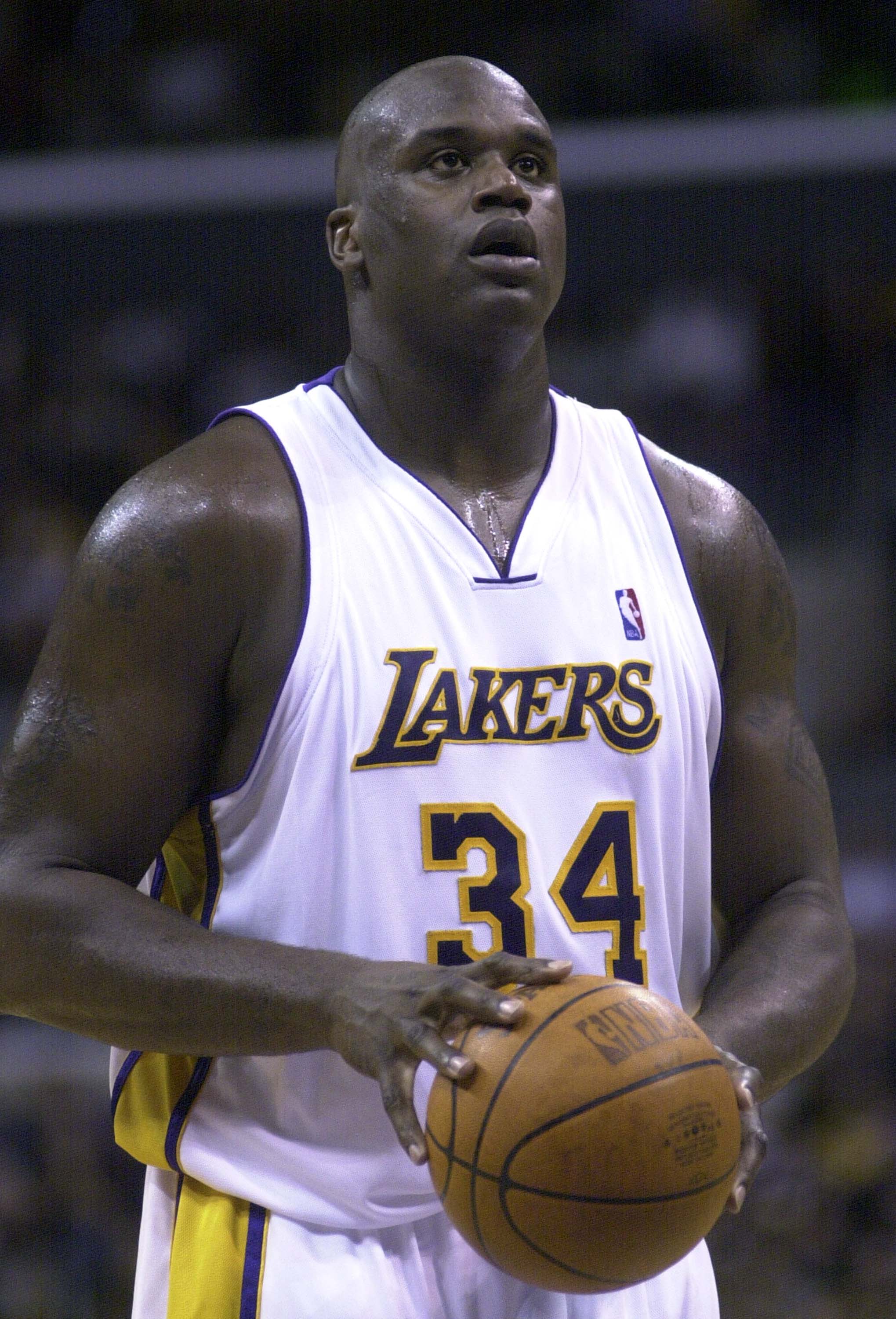
NBA Finals Stats: 28.8 PPG, 13.1 RPG, 3.4 APG, 0.5 SPG, 2.1 BPG
NBA Finals Record: 4-2
At his peak, Shaquille O’Neal was the most dominant player in NBA history. O’Neal made a habit out of embarrassing the NBA’s best bigs en route to 4 NBA championships in his career with an unstoppable game from 5 feet and in from the basket. With size, strength, and speed, O’Neal led his teams to 6 NBA Finals appearances in his career. O’Neal lost his only Finals appearance with the Orlando Magic. He went 3-1 with the Lakers, and won his only appearance with the Miami Heat.
There was no more dominant time in his career than in his 3 straight Finals wins with the Lakers from 2000 through 2002. O’Neal was named Finals MVP in all 3 series and absolutely demolished the competition in the process. In 20 NBA Finals games for the Lakers, O’Neal averaged 33.6 PPG, 14.1 RPG, and 2.4 BPG. O’Neal was the 2nd option in his Miami victory but still was an integral reason for victory.
Kobe Bryant
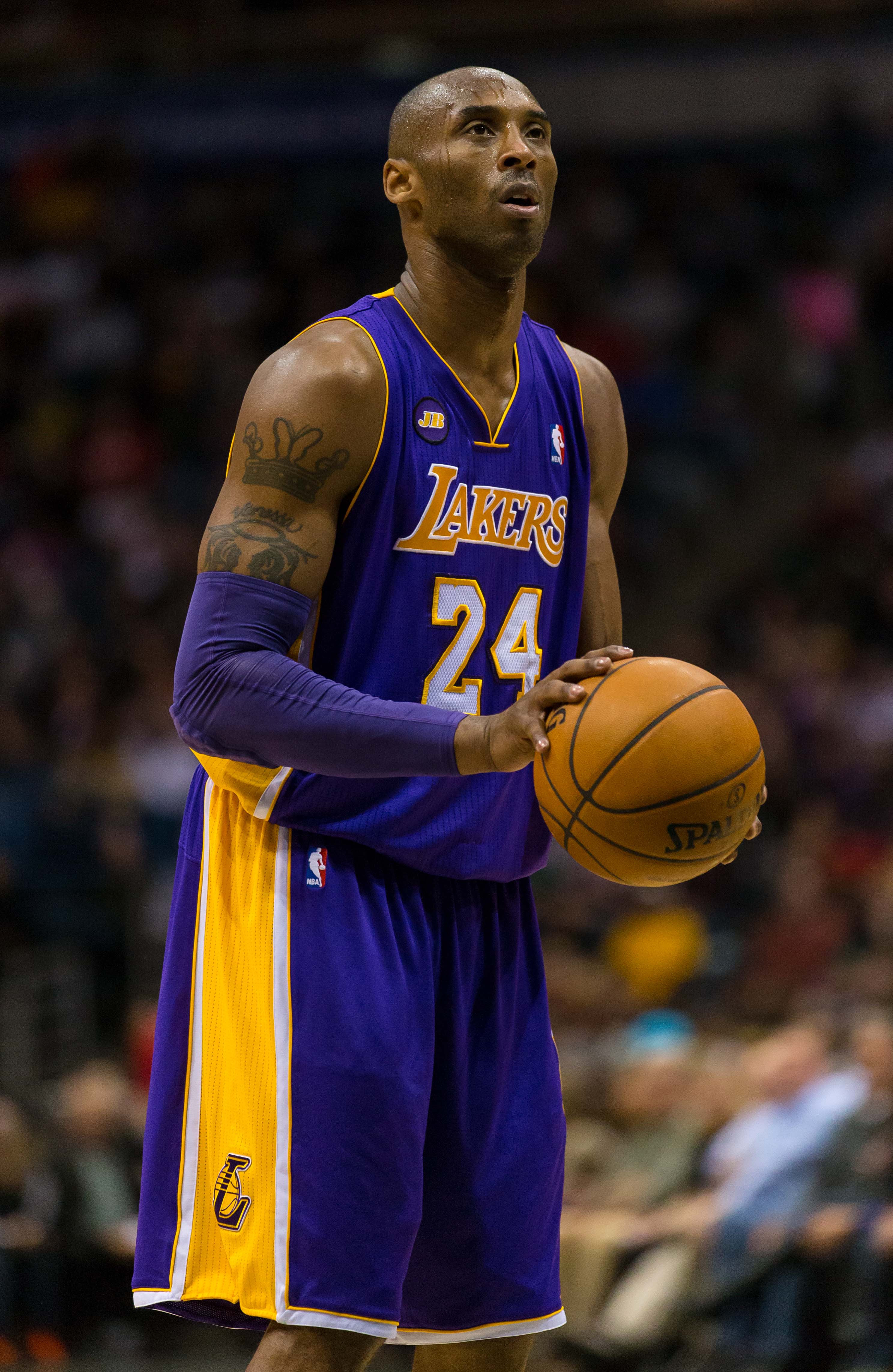
NBA Finals Stats: 25.3 PPG, 5.7 RPG, 5.1 APG, 1.8 SPG, 0.9 BPG
NBA Finals Record: 5-2
As a member of the Los Angeles Lakers for 20 years, Kobe Bryant became a generational icon and a poster child for winning in the NBA. Bryant played alongside Shaquille O’Neal for his first 3 NBA championships but was a huge reason for their success. Without Bryant on those 3 Finals runs, the Lakers would have won none of those championships, and those are the facts based on how he played. Once O’Neal left for Miami and won a title there, the narrative became that Bryant couldn’t win without him. That changed from 2008 through 2010.
From 2008 through 2010, Bryant led the Lakers to 3 straight NBA Finals appearances. After losing to the Celtics in 2008, Bryant went back to the drawing board on his game. The next year, Bryant led the Lakers over the Orlando Magic in the NBA Finals. Kobe won his first Finals MVP award with 32.4 PPG, 5.6 RPG, and 7.4 APG. Bryant would go back-to-back in 2010 when he and the Lakers got revenge on the Celtics for 2008. Bryant was again named MVP when he averaged 28.6 PPG, 8.0 RPG, and 3.9 APG in the 7-games series.
Magic Johnson
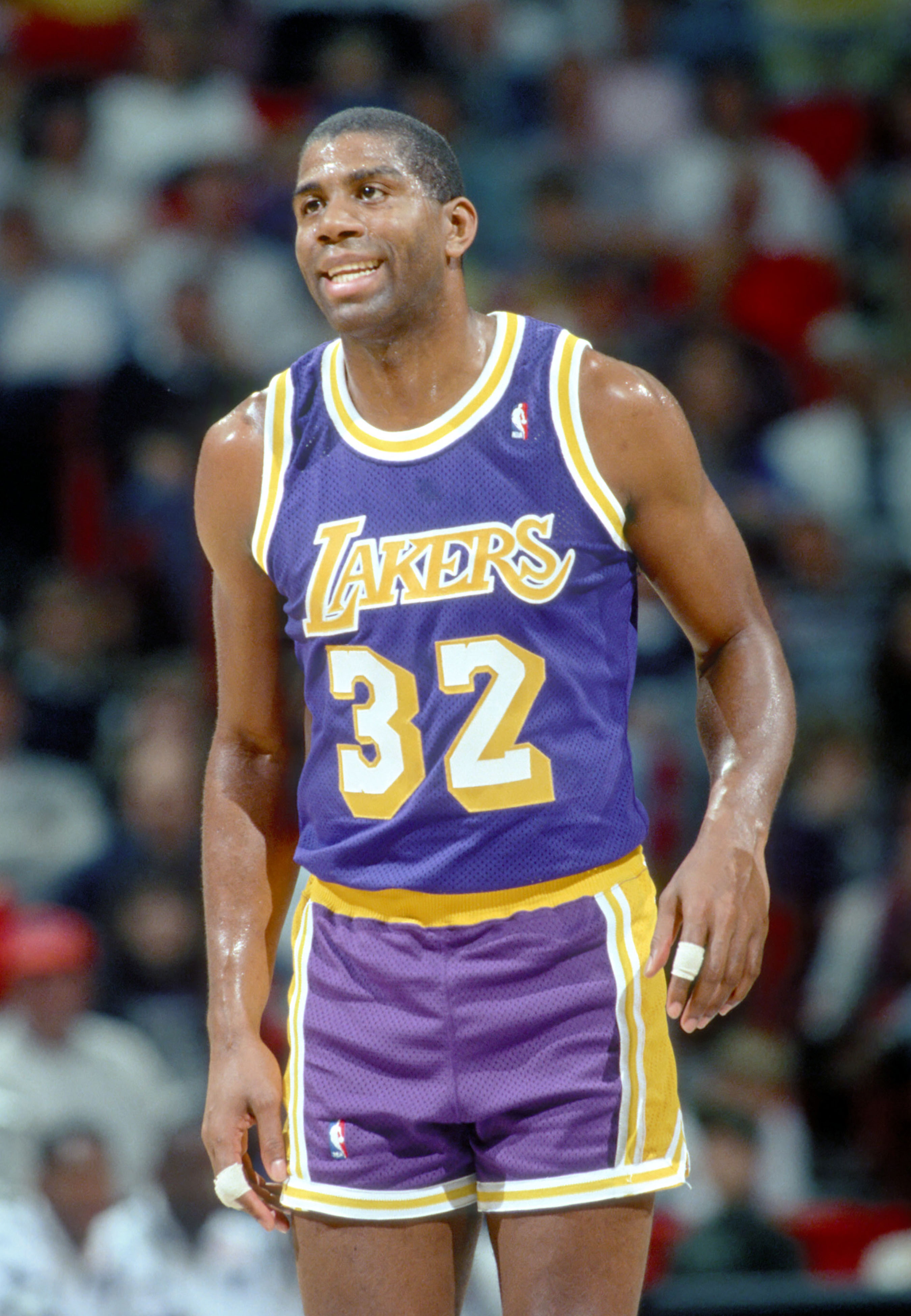
NBA Finals Stats: 19.4 PPG, 7.9 RPG, 11.7 APG, 2.0 SPG, 0.3 BPG
NBA Finals Record: 5-4
Magic Johnson is the greatest point guard to ever handle a basketball. He could run a fast break and lead an offense better than any other player in NBA history and with those talents, achieved more than most in NBA history. He led his Lakers to a total of 9 NBA Finals appearances during his career and brought home 5 NBA championships. He battled with the likes of Larry Bird and Michael Jordan to come out on top as one of the best players in the 1980s.
Johnson’s most notorious Finals performance came in his rookie season in 1980. With Kareem Abdul-Jabbar injured for Game 6, Johnson filled in for him at the center. Magic dropped 42 points, 15 rebounds, and 7 assists in the Game 6 win and claimed Finals MVP in his very first season in the NBA. Johnson would go on to win 2 more Finals MVP awards in his career and 4 more NBA titles.
Kareem Abdul-Jabbar
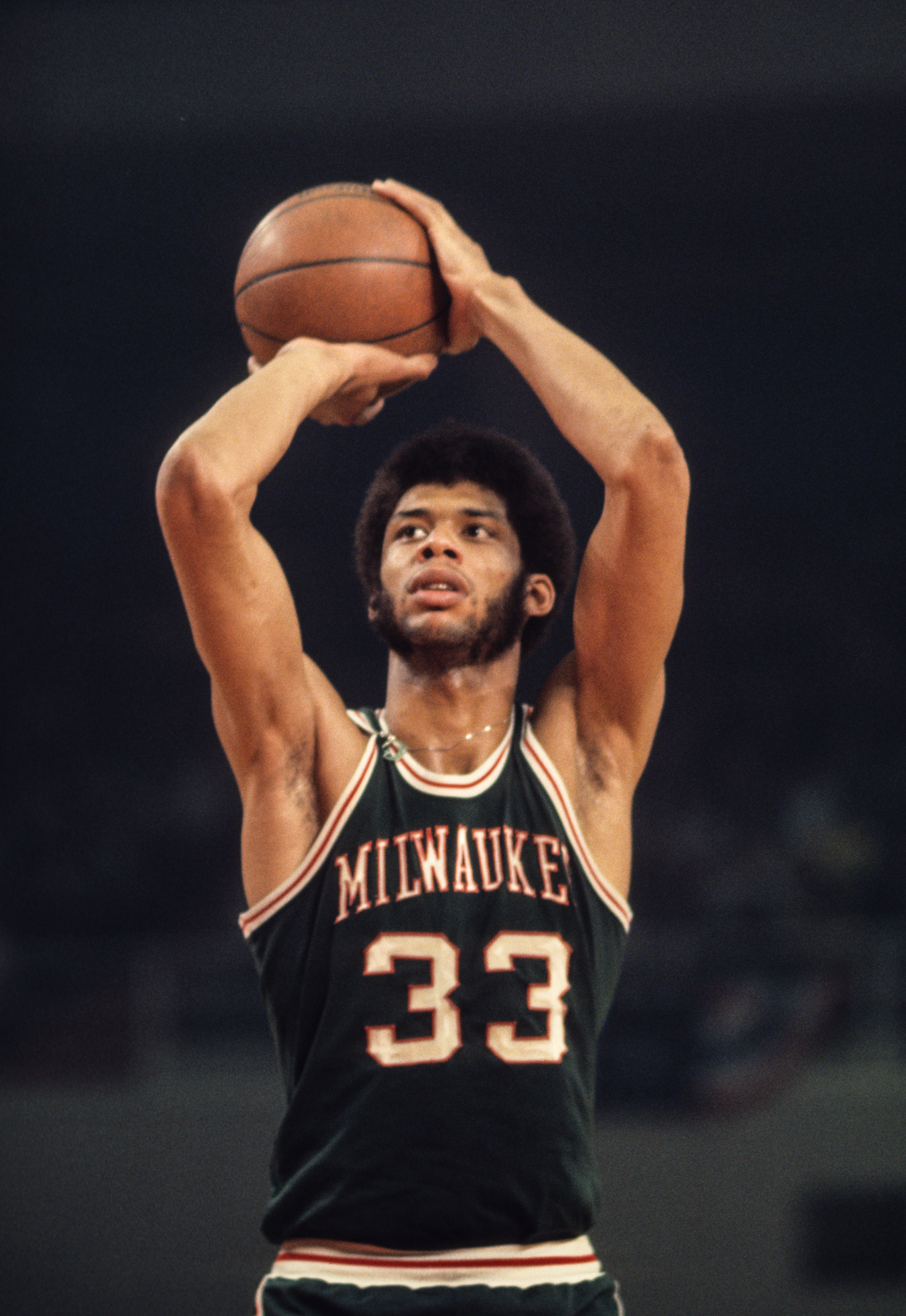
NBA Finals Stats: 23.5 PPG, 9.1 RPG, 3.2 APG, 0.9 SPG, 2.2 BPG
NBA Finals Record: 6-4
When he retired from the NBA in 1989, Kareem Abdul-Jabbar was considered to be the greatest basketball player in NBA history. Kareem had become the NBA’s all-time leading scorer and won 6 NBA championships in the process. He was unstoppable in his prime, armed with a skyhook jump shot that was virtually impossible to stop for any defender in the NBA at the time. Abdul-Jabbar would go on to win 1 NBA title with the Bucks in 1971 and 5 NBA titles with the Lakers in the 80s.
Kareem Abdul-Jabbar was able to win 2 Finals MVP awards out of the 6 NBA titles he won in his career. In 1971 with the Milwaukee Bucks, Kareem won Finals MVP in a 4-game sweep over the Baltimore Bullets. Kareem averaged 27.0 PPG and 18.5 RPG in the win. Kareem wouldn’t win his next Finals MVP until 14 years later with the Lakers. In a 6-game series win over the Celtics, Kareem averaged 25.7 PPG and 9.0 RPG to win the NBA championship.
LeBron James
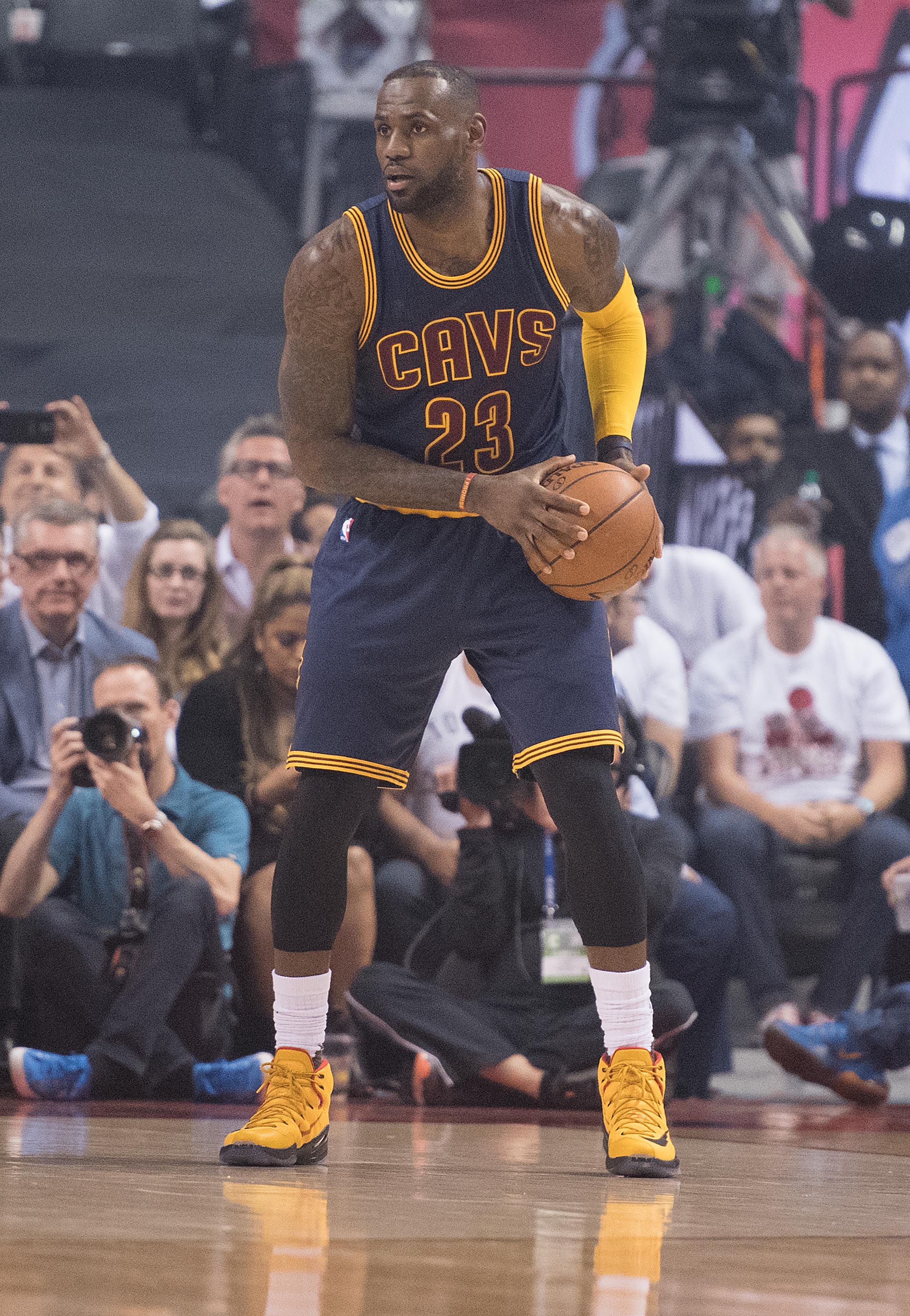
NBA Finals Stats: 28.4 PPG, 10.2 RPG, 7.8 APG, 1.7 SPG, 0.8 BPG
NBA Finals Record: 4-6
Playmaker, scorer, rebounder, defender, leader, and winner. These are all words we can use to describe the life and career of LeBron James. Throughout his career, James has made the most out of nothing in his career especially when it came to the NBA Finals. James has led his team to 10 total NBA Finals during his 20 seasons in the league and has taken home 4 NBA titles with 4 Finals MVP awards. Heck, there were even series’ that he was the best player on the floor from either team playing.
James has led 3 different NBA franchises to NBA championships, something no other player in NBA history can say. With the Miami Heat, James led the team to 4 straight NBA Finals appearances with back-to-back wins in 2012 and 2013. In Cleveland, James led the Cavaliers to 4 straight Finals appearances as well. He led the greatest comeback in NBA history in 2016 when they came back from 3-1 down in the series to win. He also led the Lakers to an NBA championship in 2020 during the Bubble format at Disney World.
Michael Jordan
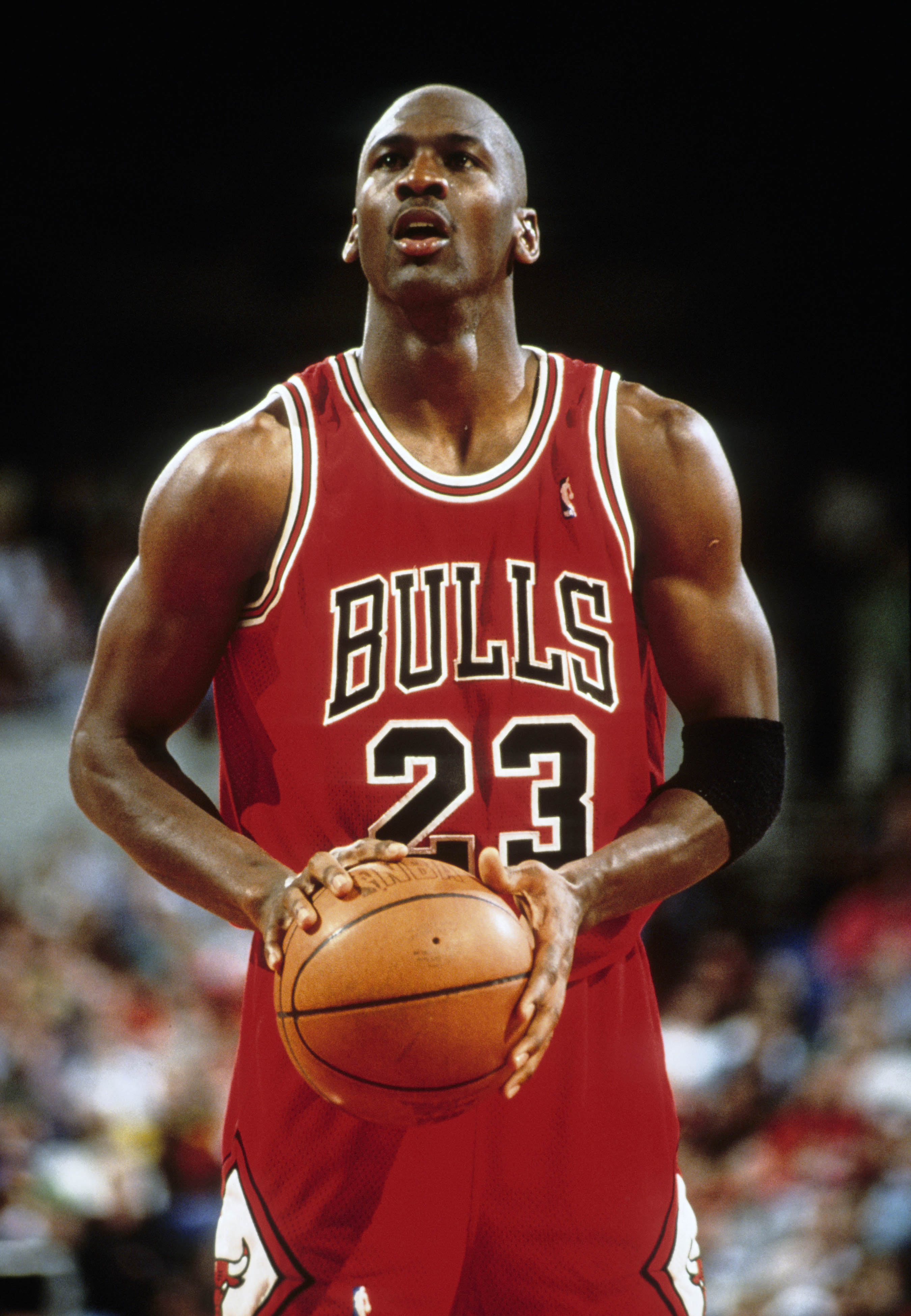
NBA Finals Stats: 33.6 PPG, 6.0 RPG, 6.0 APG, 1.8 SPG, 0.7 BPG
NBA Finals Record: 6-0
It should come as no surprise to anyone that we are ending this list with Michael Jordan. As the greatest player who ever lived, Jordan was the definition of overcoming adversity and dominating the competition during his NBA career. After being beaten up by the Celtics and Pistons during the 80s, Jordan got tired of losing and getting abused while it happened. He came back bigger and stronger than ever to lead the Bulls to 6 NBA championships in 8 seasons in the 1990s.
In the 6 NBA championships that he led the Bulls to victory, Jordan was the best offensive and defensive player on the court in all 6 series. He was rewarded with all 6 Finals MVP awards in each victory and his legacy was cemented. From 1991 through 1993, Jordan defeated the Lakers, Trail Blazers, and Suns in the NBA Finals. From 1996 through 1998, he defeated the SuperSonics and Utah Jazz twice. Jordan has the single-highest scoring Finals series average ever with 41.0 PPG and is widely considered to be the greatest NBA Finals performer that ever lived.
We sincerely appreciate and respect you as a reader of our site. It would help us a lot if you follow us on Google News because of the latest update.
Thanks for following us. We really appreciate your support.

